#and then i developed a free of brittle hollow
Explore tagged Tumblr posts
Text
I swear every planet in outer wilds scared me to some degree but by god it was wonderful
#terran talks#outer wilds#dark bramble scared me but yknow what else did#giants deep bc heavy gravity unclear water#when i first descended in that one and saw past the atmosphere the first time i bolted so fast back out of there#and then i developed a free of brittle hollow#most times i fell i had to quit the game even when i knew what would happen
12 notes
·
View notes
Text
🪷 The Lotus Flower in Mysterious Lotus Casebook 🪷
i. Growing Deep Roots
As noted by difeisheng, Li Xiangyi is an image more than he is a person. He’s the “symbol” and “beating heart” of the Sigu sect; “he embodies everything [the sect] stands for” and “has become one with every person he represents” in his role as a leader. As such, one might say he doesn’t exist as an individual who’s allowed the luxury of flawed, fluid humanity. Rather, he’s fixed into an object: a shield protecting those under his care, a mirror reflecting those he’s taken upon himself to be the champion for.
While a heavy burden to carry, this identity as image is also shown to be brittle, hollow, like a hazy mirage which is more dazzling appearance than substance. Even Fang Duobing introduces Li Xiangyi to Li Lianhua by showing him a painting of his shifu — ink on a page, a person turned into a hero to be worshipped and idolated.
Li Lianhua, over the ten years that pass after the Great Battle of the East Sea, works to plant and cultivate a new identity in the same way one might grow flowers. Li Lianhua forms deep roots and grows out of the mythical hero’s shell he’d been carrying as Li Xiangyi, thus developing an identity which is solid and grounding in contrast — an identity which involves “walk[ing] within a crowd instead of [soaring] above it.”
This shift from image to person is itself rooted in the lotus mantra (written by Buddhist Layman Pang during the Tang Dynasty) which Li Xiangyi first encounters after monk Wu Liao rescues him:
一念心��净 莲花处处开
The heart attains peace with a single thought; Lotus flowers bloom all around.
Although the exact timeline is left to interpretation, it’s implied that the lotus mantra operates as a catalyst of change for Li Xiangyi and that he changes his name to Li Lianhua after reading it. Now what is it about it that speaks to Li Xiangyi so deeply in that moment? As noted in 《 人間福報 》, the lotus mantra teaches us that a pure heart will result in an open and enlightened mind. One subtle, profound thought rife with compassion is enough for a person to glimpse Buddha in a flower, a leaf, a grain of sand or a speck of dust. In short, “if you can find peace within yourself, then you will find peace everywhere.” Perhaps Li Xiangyi, at his lowest point, finds solace in the prospect of stripping his life down to its very core and searching for purity, wisdom and peace within his troubled heart.
By renaming himself 莲花/liánhuā lotus flower, Li Lianhua takes his destiny into his own hands; he empowers himself into reshaping his identity and laying down the foundations for the person he wants to become. Similarly to The Yin-Yang Master: Dream of Eternity which tells us that “names are the shortest spells in the world,” Li Lianhua’s new name functions as a spell which speaks a new him into existence. It’s a deliberate choice, a conscious attempt at breaking free from the suffocating shell Li Xiangyi was trapped in and become a person of his own choosing.
The act of (re)naming notably also extends to Li Lianhua’s abode which he dubs 莲花楼 “Lotus Tower.” In addition to this significant choice of name, it’s interesting to note that Li Lianhua starts growing vegetables inside Lotus Tower when he’s left with nothing after his demise at the East Sea and is facing starvation. As such, his home is quite literally a site not only of self-sustenance and survival, but also of growth — a growth which requires hard work, patience and faith and nearly brings Li Lianhua to tears when his hopes are finally rewarded and the seeds he planted begin sprouting. The act of physically planting vegetables and learning to cook those vegetables speaks of a refreshing and grounding simplicity — of something disarmingly vulnerable and human after playing the role of a god-like figure. Li Lianhua has sweat on his brow and hope in his heart; he plants seeds, watches them grow and keeps himself alive by his own hands.
It seems it’s not only Li Lianhus’a home, but also his very person, which steadily grow into a lotus flower. Li Lianhua wears a variety of hairpins directly linked to the lotus, and the colour coding of his garments moves from the red he used to wear as Li Xiangyi to a lighter palette filled with greens and blues — colours which are more obviously linked to nature.
ii. Life Borrowed and Given Away
The lotus, both traditionally and within the drama itself, is closely connected to the theme of rebirth. On a literal level, the exotic lotus flowers of Cai Lian Manor grow directly from the corpses of the victims drowned in the pond, thus embodying life born from death. thawrecka writes in their story that Li Lianhua is “nothing but a lotus nurtured by a walking corpse, a body that doesn’t realise it should already be dead.” On a figurative level, the lotus grows in muddy water but blooms unsullied every morning, thus symbolising rising from a dark place and growing into something beautiful and colourful despite all the odds. The different stages of the lotus’ blooming can be taken to represent the beginning, middle and end of a spiritual path in Buddhism — a parallel to the theme of 趟/tāng taking a journey which underscores the drama in various ways.
Li Lianhua’s journey, more specifically, is that of a lotus being reborn. The soundtrack piece 《 一壶莲花醉 》 “A Pot of Lotus Wine” emphasises this connection in the following lines:
问一句莲花的悲喜 断一柄弃剑入青泥
I ask about the joys and sorrows of the lotus; A broken, abandoned sword is thrown into the mud.
Not only does Li Lianhua keep stressing at different points of the drama that Li Xiangyi is dead and all that is left behind is Li Lianhua; he even breaks his own sword Shaoshi at the end of the story, thereby physically reenacting a process of destruction—death—and rebirth. As Li Lianhua writes in his farewell letter:
剑断人亡
My sword is broken, and I will be gone.
The significance of Li Lianhua’s action is further intensified here by the fact that the sword in the song is said to be thrown into 泥/ní mud, the site from which a lotus flower grows.
Considering that Shaoshi operates as a device embodying Li Lianhua’s character development throughout the drama, the fact that Li Lianhua decides to break it in the last episode should be taken as a key moment in which he chooses how his own narrative is going to end. Li Lianhua decides to kill for good the glorious image of Li Xiangyi which has become sullied with pain and regret in his heart, so that a simple, fragile peace can begin growing in its place like a lotus flower amidst the mud.
However, the tragedy of Li Lianhua’s narrative is that the rebirth he works to achieve for all these years is not his own to enjoy and never was intended to be. After the Great Battle of the East Sea, as Li Lianhua is reborn from Li Xiangyi and starts planting seeds all around him, he has already accepted that he’s nothing but a ghost, “wandering in the jianghu to close his loose ends and finally [...] vanish without a trace, not even a body left behind.” As mx-myth remarks, even the shift in his garment colours to an overwhelming amount of white as the story progresses makes it clear that he’s resigned to go and has “already started dressing for his own funeral.”
The lotus flower symbolism permeating the narrative accentuates this bone-deep, unshakable resignation. While imprisoned by Jiao Liqiao, Li Lianhua is full of an aching, bittersweet fatalism when he recites a section of Guan Hanqing’s《 窦娥冤 》“The Injustice to Dou E”:
花有重开日 人无再少年 不须长富贵 安乐是神仙
Flowers will blossom again, But a man can never be young again. Seek not eternal wealth; You only need to be content.
Independently from the original meaning of the lines written by Guan Hanqing, the words seem to take on a sad, wistful quality when spoken with a bitter smile by Li Lianhua. In this scene, while the speaker reflects that rebirth occurs outside of themselves in flowers, they acknowledge that their own reality is one inevitably bound to end in old age and decay. Instead of looking forward to a bright future, the speaker doesn’t express any dreams nor ambitions and is only grateful that they’re alive this minute, this second, without any future prospects awaiting them. Perhaps a similar sentiment is reflected in the following lines from 《 一壶莲花醉 》 “A Pot of Lotus Wine”:
了了心事只 不负众生 而已
After settling my worries, I just want to live up to all sentient beings.
Li Lianhua’s connection to the lotus flower, in fact, was always meant to be one of non-attachment. While Buddhism believes desire to be the root of all suffering, the lotus symbolises non-attachment due to being “rooted in mud (attachment and desire)” while “its flowers blossom on long stalks unsullied by the mud below.” This explains in part why the lotus is considered pure and noble. For Li Lianhua, this non-attachment takes on sorrowful connotations: it means that he stubbornly refuses to reap the seeds he sows and focuses his purest heart and will into ensuring those around him get to reap them instead. Non-attachment means allowing himself enough (a roof over his head, food on his plate) to survive, but rarely letting himself indulge in the precious luxuries of reciprocated love and care — of carefree joy and thirst for adventure.
The ten years he lives after his first death at the East Sea are, for him, only borrowed time he didn’t deserve — borrowed time not dedicated to himself, but rather dedicated to others.
In many ways, Li Lianhua’s path effectively goes full-circle by the end of the narrative. When he and Di Feisheng reminisce about the moon they remember from ten years ago, they conclude that today’s moon isn’t any brighter than the one alive in their memory: rather, it remains constant, unchanged, as though the past ten years never existed as anything other than a short pause in the story, a coma, long enough for wrongs to be righted but not for an already-dead person’s fate to be changed.
It’s interesting and particularly significant that the Styx flower (忘川花, from 忘川 “River of Forgetting” in the original Mandarin) is said throughout the drama to be the only thing capable of saving Li Lianhua’s life. In traditional Chinese culture, the Styx or River of Forgetting is part of the process of reincarnation; only by crossing it (and forgetting everything they’ve ever experienced and everyone they’ve ever loved) can a person finally reincarnate. For Li Lianhua, salvation through rebirth comes at a high cost — a price he’s evidently been ready to pay since the beginning, even if it means turning him into a ghost who must vanish from the story in order for those around him to grow and thrive further.
When Li Lianhua breaks his own sword to allow for rebirth, it’s not himself he’s saving. His sole purpose throughout his journey as Li Lianhua is to use whatever meagre strength he has left, whatever passion and drive are still alive in him, to save the world in any small ways that he can. He becomes a doctor who heals people; he looks for answers and solves mysteries to atone for the sins he thinks he has committed and rectify the mistakes he thinks he has made, so that those he has hurt can finally find peace and comfort.
The most powerful legacy Li Lianhua intends to leave behind by the end of the story has nothing to do with himself and everything to do with the people around him who he never truly admits he loves — the messy, imperfect world that’s caused him so much pain but that he nevertheless insists on saving with everything he has.
Most strikingly, Li Lianhua chooses—whether consciously or not—to leave the life and future he’s renounced for himself to his companions Fang Duobing and Di Feisheng. The only traces he purposefully leaves behind live in them: in the Yangzhouman coursing through Fang Duobing’s body; the home, dog and recipe book he passes onto him; the worthy opponent he leaves for Di Feisheng to fight in his stead after he’s gone…
Fang Duobing, by the end of the story, has grown into more than a disciple and a friend to Li Xiangyi/Li Lianhua: he himself has become the lotus flower bringing renewed life after Li Lianhua has left the narrative, thereby taking Li Lianhua’s legacy into a hopeful, vibrant future. As mx-myth mentions in their colour analysis, Fang Duobing notably wears bright pastel tones including a large amount of green/blue — a colour coding which emphasises Fang Duobing’s connection to spring and, by extension, new life and beginnings. “Life will always go on if there’s spring”; and so Fang Duobing’s youth, vitality and optimism can grow in the empty space left behind by Li Lianhua after he fades into the autumn of his life.
While Li Lianhua’s predominantly light colour palette might appear to align him with other characters in the drama who have left the past behind and are looking towards the future, Li Lianhua made peace long ago with the knowledge that he’s destined not to belong in that future. Just as the Lotus Sutra teaches us that “the inner determination of an individual has great transformative power” and “gives ultimate expression to the infinite potential and dignity inherent in each human life,” Li Lianhua focuses all his transformative efforts on creating a future which, despite having no place for him, will be fertile ground for the entire martial arts world to grow deep, healthy roots. In Li Lianhua’s own words:
幼芽生枝 新木长成 武林也一样 这未来如何 谁又能说得清楚呢
The young sprouts and the new trees grow. The martial arts world is the same. What does the future hold? Who can say clearly?
Should we say, then, that Li Lianhua’s story is one of sacrifice, self-renunciation and resignation — of drifting inevitably towards death as a flower carried by a stream? As he disappears on a boat and is asked where he’s going, Li Lianhua gives a response which echoes his first death at the East Sea in a way that feels entirely deliberate:
小舟从此逝, 江海寄余生
From now on I would vanish with my little boat; For the rest of my life on the sea I would float.
How are we to understand a person being reborn simply so they can pass on that new life to others, and being convinced that their only true value lies in their death?
Perhaps, in spite of it all, we can find some small comfort in the knowledge that, no matter how sorrowful Li Lianhua’s fate, it’s at least one that he chooses — one that he has full control over, even poisoned and robbed of his life force as he is. As the lyrics of 《 一壶莲花醉 》 “A Pot of Lotus Wine” underline, “it’s just a matter of picking an ending that you like.” Perhaps that’s all that truly matters.
wuxia-vanlifer makes an excellent point when asking: “What would be more tragic? That he never believed he was loved? Or that he did, but vanished anyway?” While I don’t have an answer to offer, there’s one thing I can say. Li Xiangyi, Li Lianhua — they live and die by love. They can’t conceive of themselves as anything other than a sacrificial tool because, for all that they pretend to be aloof and untethered, they actually love others—and the world—in a bone-deep, profound way they’ve never loved themselves. That love is not only the true driving force behind Li Lianhua’s character and the fate he chooses: it’s the beating heart of the entire drama.
“In this life, I have loved and I have been loved. That is enough.”
Shoutout to the following authors and bloggers whose brilliant words and ideas inspire me, as well as this gorgeous video 💖
ao3: @extraordinarilyextreme @thawrecka
tumblr: @difeisheng @extraordinarilyextreme @mx-myth @wuxia-vanlifer @xinyuehui
#mysterious lotus casebook#莲花楼#li lianhua#li xiangyi#cheng yi#fang duobing#di feisheng#it's sad nerd hours lmao 💕 now we can all suffer together 😘#i'd apologise for shamelessly referencing yym every chance i get even when it's barely relevant but.... well i won't 😌💅#also - please tell me if you notice errors or inconsistencies in any of my points ✨#although i'm always very thorough with my research i don't have a native person's knowledge of chinese language and culture#no doubt i'll think of lots of changes and additions i want to make once this is out there ssdhds 🥴 why is publishing anything so hard??#text: mysterious lotus casebook
99 notes
·
View notes
Text
Enchant’s FFF Drabbles Masterlist

[ID: Teal water color banner with orange text that reads "Enchant’s FFF Drabbles Masterlist" /finish ID]
Time for another masterlist because I’m extra. Here’s all the stories, poems, and ficlets I posted with the following prompts. I am shookth I wrote this much, tbh. Ranges from ships to character studies to little tales, this list has a lot. I’m hoping to be an avid participator because the prompts gives me the inspo and guts. Heed the TW in the A/N section, thanks. Basically, an organized list for me because tags aren’t helpful.
Note: I’ll reblog the list when I post something new.
Side-note: Ignore the fanfic, if you want to read original things. All fandoms are listed for easier navigation.
#FFF01 - Gimme Fluff - The Warm Relief (The Flash ficlet)
#FFF02 - Auch My Heart - Passionate Longing (Captain America ficlet)
#FFF06 - Fight Me! - Rising Against Unfairness (Lines of a Script to Ignore Tale)
#FFF08 - Bittersweet Beginnings - A Rocky Development (Original Story)
#FFF11 - Bruised Sky - The Resilient Spirit (Captain America ficlet)
#FFF12 - Into the Wild - The Surreal Trip (Legends of Tomorrow ficlet)
#FFF15 - Midnight Drive - The Meandering Roads (OC Study)
#FFF18 - Jumping Fences - Thin Barriers (Legends of Tomorrow or The Flash ficlet)
#FFF19 - House of Stars - The Radiant Glimpse (Semi-Legends of Tomorrow ficlet)
#FFF21 - We Are Not Alone - Untamed Sentience (Blasted Scorn Story)
#FFF23 - Shelf Life - The Restive Obstacle (OC Study)
#FFF24 - On the House - The Uncanny Manor (Legends of Tomorrow ficlet)
#FFF29 - Golden Rings - A Crestfallen Wish (Original Story)
#FFF30 - Lethal Flowers - The Effective Solution (Original Story)
#FFF31 - Deep End - The Drenched Nightmare (Legends of Tomorrow ficlet)
#FFF34 - Weeds and Ruins - Collapsed Forest (Poem)
#FFF35 - Locked In - Ploying to Escape (Original Story)
#FFF37 - Strange Lands - Peculiar Sight (Poem)
#FFF38 - Forbidden Knowledge - Concealed Information (Poem)
#FFF39 - Furry Friend - An Eager Keeper (Original Story)
#FFF40 - Mysterious Masquerade - Masked Celebration (Captain America ficlet)
#FFF41 - Blooming Blossom - Neither One Prepared (Semi-Legends of Tomorrow ficlet)
#FFF44 - Hollow Walls - The Vacant Disturbance (Legends of Tomorrow ficlet)
#FFF45 - Familiar Melody - Dear Euphony (OC Study)
#FFF47 - Don’t Take My Heart - Sudden Realizations (Semi Black Panther ficlet)
#FFF48 - Cold Object - Glacial Contemplation (Black Widow ficlet)
#FFF50 1 - Smoke and Mirrors - The Haunted Beast (OC Study)
#FFF50 2 - Unusual Concoction - The Nifty Elixir (Original Story)
#FFF50 4 - Shattered Sunshine - The Clear Brilliance (Legends of Tomorrow ficlet)
#FFF51 - Summer Storms - The Overwhelming Capability (The Flash ficlet)
#FFF52 - Child’s Play - Title with the same prompt name (Constantine ficlet)
#FFF53 - Come Back - Fleeting Encounter (True Devotion that Remains Constant Tale)
#FFF54 - Rainbow Kisses - Drizzles of Love (Captain America ficlet)
#FFF55 - Twisted Dreams - The Night Terrors (Captain America ficlet)
#FFF56 - Dress to Impress - Sense of Style (Black Panther ficlet)
#FFF57 - Crystalline Waters - Minerals Under the Sea (Original Story)
#FFF59 - I Beg You - Fulfilling Necessities (The Sims 2 ficlet through the POV of the player a.k.a me)
#FFF60 - Soft Bones - Brittle Bones (Poem)
#FFF61 - Wild and Free - Unleashing the Grand Treasure (Blasted Scorn Story)
#FFF63 - Creeping Magic - The Mystical Journey (Legends of Tomorrow ficlet)
#FFF64 - Made From Stardust - Celestial Spectacles (Poem)
#FFF65 - Better Than This - The Reclaimed Individuality (Black Lightning ficlet)
#FFF66 - Golden Decay - The Languid Flow (Original Story)
#FFF68 - We Meet At Midnight - The Peculiar Introduction (Doom Patrol and Constantine ficlet)
#FFF69 - Blood on My Name - The Arduous Task (Lines of A Script to Ignore Tale)
#FFF72 - Hidden at the Shadows - Cautionary Narratives for the Inexperienced (Blasted Scorn Story)
#FFF74 - Drifting in the Wind - Through the Seasons (Poem)
#FFF75 - Dreams of Tomorrow - To the Dreamer (Poem)
#FFF80 - Comfort in the Cold - The Cozy Shelter (Black Lightning ficlet)
#FFF83 - Everyday Hero - The Earnest Fight (Black Lightning ficlet)
#FFF89 - Dipped in Silver - Severe Uncertainty (True Devotion that Remains Constant Tale)
#FFF90 - Mirror Image - The Plaintive Reflection (Doom Patrol ficlet)
#FFF92 - Sweet Surprise - A Sudden Treat (Original Story)
#FFF94 - Riveting Revival - The Clear Reappearance (Original Story)
#FFF95 - Dance the Night Away - Chance for the Night (Original Story)
#FFF97 - Cleansing of the Soul - Solace in Rain (Poem)
#FFF99 - Undiscovered Colors - A Vivid Display (Lines of A Script to Ignore Tale)
#FFF100 1 - A New Dawn - Early Check-In (Blasted Scorn Story)
#FFF100 3 - The Sweetest Blood - An Aggravating Issue (Original Story)
#FFF100 4 - Hidden Path - Not Known Track (Original Story)
#FFF100 5 - Stay With Me - The Expressive Tending (Black Lightning ficlet)
#FFF101 - Broken Scars - Bordered City (The Falcon and the Winter Soldier ficlet)
#FFF102 - Fairy Lights - The Soulful Ache (True Devotion that Remains Constant Tale)
#FFF103 - Burn It Down - Invisible Constrained Rage (Original Story)
#FFF104 - Stronger Together - Rigid Compromises (Blasted Scorn Story)
#FFF105 - Ruined and Destroyed - Brink of Destruction (Original Story)
#FFF108 - Starlight Paths - Across the Unknown (Original Story)
#FFF109 - Littered Souls - A Vital Job (Original Story)
#FFF110 - Moon Magic - Moonlight Charms (Poem)
#FFF112 - Sunny Delights - Sunlight Rapture (Poem)
#FFF113 - Hold Me Closer - Watch It Unfold (Lines of A Script to Ignore Tale)
#FFF120 - A Greater Horror - What’s Lurking From Far (Original Story)
#FFF125 - Think Twice - Trying to Pick (Original Story)
#FFF127 - Green with Envy - Warranted Ire (Original Story)
#FFF129 - Under the Moonlight - A Discreet Moment (Original Story)
#FFF130 - Drowned Thoughts - Locking Up Crushed Hopes (Original Story)
#FFF132 - A Taste of Blue - The Chilly Outlook (Original Story)
#FFF141 - Chaos Unfurling - Break-Out Brawls (Blasted Scorn Tale)
#FFF143 - As Good as There - Searching for a Muse (Poem)
#FFF144 - Foul Play - Inane Issues and Other Non-sense (Original Story)
#FFF147 - The Sound of Light - In A Passage (Original Story)
#FFF148 - The Big City - A New Start (Original Story)
#FFF155 - Out of Containment - Surrounded by Buffoons (Original Story)
#FFF159 - Pride Before the Fall - Price for Unwise Actions (Original Story)
#FFF160 - The Dazzling Screen - Delay in Pursuits (Lines of a Script to Ignore Tale)
#FFF161 - Storms and Thorns - Awakened Forces (Poem)
#FFF162 - The Letter - Heeding Wise Words (Original Story)
#FFF163 - Splash of Waves - The Fiery Temperature (Original Story)
#FFF164 - A False Confession - Feeble Diversion (Original Story)
#FFF166 - Count the Ways - Done with Pride (Original Story)
#FFF168 - Sleepless Nights - A Secret Retreat (Original Story)
#FFF170 - Eager for Details - An Upscale Composition - (Original Story)
#FFF172 - A Ghost from the Past - Dare to Examine (Poem)
#FFF173 - No Rest for the Wicked - Causing an Uproar (Original Story)
#FFF174 - Monster Mash - Crash a Bash (Original Story)
#FFF175 - Gloomy Daze - The Genuine Repose (True Devotion that Remains Constant Tale)
#FFF179 - Dance, Dance Revolution - On the Set (Original Story)
#FFF181 - Crystallized - Gain a Result (Original Story)
#FFF183 - Late Night Train - Getting a Transit (Original Story)
#FFF184 - Set the Stage - Behind the Curtains (Lines of a Script to Ignore Tale)
#FFF186 - Fine By Me - Bustling Tasks (Original Story)
#FFF190 - Trapped in the Dark - Confined in Nowhere (Poem)
#FFF192 - Sea and Sun - Near the Shore (Original Story)
#FFF195 - Filled with Clarity - Refined Craft (True Devotion that Remains Constant Tale)
#FFF196 - Against the Flow - Altering a Tide (Original Story)
#FFF199 - Didn’t Mean It - Afflicted By Deciet (Original Story)
#FFF201 - Comedian’s Night - Intermission for Eluding (Original Story)
#FFF205 - Where the Flowers Grow - Spots of Growth (Poem)
#FFF206 - Sink or Swim - Those Rueful Woes (Original Story)
#FFF215 - Mall at Night - Ensuring an Outlook (Original Story)
#writeblr#enchant's masterlists#creative writing#flash fiction friday#flashficfriday#enchant: original works#enchant: fanfics
8 notes
·
View notes
Text
Wish Upon A Star
Title: Wish Upon A Star
Fandom: Kingsman
Pairing: Agent Whiskey x Reader
Author: @sheerfreesia007
Words: 1,428
Warnings: Fluff
Permanent Tag List: @paintballkid711, @fioccodineveautunnale, @phoenixhalliwell, @synystersilenceinblacknwhite
Author Notes: This was a request for Whiskey hearing the reader’s birthday wish but we couldn’t do that otherwise the wish wouldn’t come true so I improvised! I hope you enjoy it. Feedback is always welcome.
Gif Credit: Google

You sat on the cold ground staring up at the night sky. Still hearing the chatter and happy cheers from the party not that far from you, you smiled warmly and let your eyes dart around the landscape of sparkling stars above you. Out here in the country there wasn’t as much light pollution so the stars were more pronounced to your eyes. There were so many sparkling balls of gas dotting the midnight black sky that it took your breath away.
Hearing a loud cheer from who you assumed was Tequila you smiled solemnly at the sound as you brought your knees up and wrapped your arms around them in comfort turning your head to look over at the bonfire that they had going. You weren’t much in a party mood right now, not after the phone call from your Mom. She had called to let you know that your grandma was sick and that the doctor’s didn’t have a good diagnosis. Sighing softly you turned your eyes back up to the stars.
You had been prepping for a new mission that you would be going on in just a few short weeks. And now with what your mom had told you didn’t think that you’d be able to take time off to go see your grandma. Your eyes searched the sky trying to find solace in it as tears slowly fell from your eyes down your cheeks. Just then your eyes picked up a shooting star and you quickly shut your eyes.
“Please, let me see my family before I go on the mission. I need to see Gran before I leave.” you whispered softly out into the air before opening up your eyes and swiping at the tears on your cheeks. Sighing deeply you rose from your spot on the ground and began walking towards the bonfire, not noticing the quiet cowboy watching you with concerned eyes.
Jack had noticed as soon as you had shown up that something was off. You were much more quiet than normal and while you smiled and laughed brightly with your friends and colleagues it sounded hollow and brittle. You were putting on an act.
After working with you for a few years Jack took pride in knowing who you were as a person and how you acted. He loved the friendship that the two of you had developed and continued to nurture together. He had even started to grow deeper feelings for you as time marched on and while he wanted to tell you how he felt about you he was still unsure of what he actually felt for you and didn’t want to misspeak before he fully understood what he felt.
It was an hour into the party that he noticed that you had disappeared. Walking around the bonfire he looked for you but never found you among the group celebrating. It wasn’t until he caught movement on the edge of the bonfire light that he spotted you slipping away from the party. With concern filling him he decided to trail you silently to see if you were alright.
When he finally did come up on you in the dark twilight he saw that you were sitting with your knees bent staring up at the stars. You looked so sad sitting there that Jack felt his heart reach out to you silently. He watched as you focused on something in the sky and he looked up to see a shooting star streak across the sky then your soft voice rang out.
“Please, let me see my family before I go on the mission. I need to see Gran before I leave.” Jack watched you quietly wondering what was going on with your grandma for you to wish for that. He watched as you stood from your spot on the ground and brushed yourself off. He knew you were going to be rejoining the party now so with his head full of questions he walked quickly back to the party himself and spent the rest of the night trying to rack his brain on what was going on with you.
“Wait you mean I can go visit my family before going on the mission?” you asked confused as tears began pooling in your eyes. Champ smiled warmly at you and nodded his head quickly.
“Yes ma’am. You’ve got three free days before you need to be back here to get on with the mission. It’s all been scheduled and you’re due to fly out on the Statesman jet in two hours, that should give you enough time to pack for three days right?” he informed you and you smiled widely before rushing over and hugging him tightly.
“Thanks Champ! I really appreciate this!” you cried softly as you hugged him.
“Don’t thank me sweetheart.” he said cryptically and you frowned softly before shaking your head and leaving the room in a hurry to go pack. You were finally going to be to go see your family.
You couldn’t keep the smile off your face as you watched your grandma sit up on bed with a bright laugh. Your family had been relieved to see you when you had shown up on their doorstep only hours ago. With open arms, tearful eyes and happy exclamations they had welcomed you home.
Now you sat with your mom and grandma just enjoying the time together with them. You had two other days to spend with them before you would have to leave but you refused to let that get you down while you were visiting with them.
“So who is this Whiskey fellow?” asked Grandma from her bed.
“Whiskey? He’s a colleague. Why do you ask?” you responded furrowing your eyebrows at her.
“Well he’s the one who called us sweetheart.” Your mom responded and you turned your head to her.
“What do you mean he called you?” you asked confused.
“Whiskey called us up and spoke to us about you feeling stressed about a mission you were due to go on after hearing the news about grandma. He set it all up for you to be able to come and visit before your mission.” your mom explained. You sat there for a moment in shock. Whiskey had set this all up for you, he had known that you were stressed and he had set this all up for you. But how had he known that this was going on in your life?
Whiskey stood next to Tequila watching as the Statesman jet landed on the tarmac and began taxing into the hangar. The large stairs were wheeled up to the side of the plane where the door was once the plane had come to a complete stop and he watched as you walked out after the pilot and copilot. You looked relaxed and refreshed after your little getaway. He smiled widely as he watched you reach the bottom of the stairs.
“There she is!” called Tequila and you turned to look at the two of them before a wide delighted smile fell across your lips. Whiskey watched as your eyes landed on him and they widened slightly before crinkling at the corners and you began rushing over to them. Instantly he knew that you knew he’d set it all up for you.
You launched yourself into him and he easily caught you around the middle holding you close. Your hands came up to cup his face and you pulled him down to you as your mouth smashed to his eagerly. Whiskey groaned softly at your fervor and returned the kiss with as much passion as you were giving. He couldn’t believe that you were kissing him right now. Never in all the years he’d known had he thought that this would be possible. He had yearned for it but had never been sure if you wanted it as well.
“Thank you.” you whispered against his lips once you pulled away. “I can’t thank you enough for what you’ve given me with this trip.”
“If you ever need anything you come to me. Got it? No more wishing on stars.” he said softly. You nodded your head and hugged him tightly.
“Hey Whiskey.” you said with a soft smirk as an idea formed in your head.
“Yeah?” he asked feeling his heart begin to pick up pace in his chest.
“What if I need you to kiss me again?” you asked feigning innocence. He smirked at you softly.
“I can do that.” he responded before pulling you into another heated kiss.
22 notes
·
View notes
Text
16. wet, rotting leaves (sensory prompts)
Jerry paced cautiously around the tree, shortsword in one hand, buckler in the other. His headlamp provided a thin stream of orange light to illuminate the marshy waters that surrounded the tree’s island, and he swept his head back and forth to drive the headlight’s beam into the nearest shades. They skittered out of the way before the light could hit them, retreating from clawing at his trouser legs and the tree’s roots. Yet another group creeping closer forced Jerry to keep moving, allowing those behind him to return. Their claws slid through the wet, rotting leaves that caked the island with a distinct slurried-slop sound—small noises, but kin to thunder in this suffocated night.
The tree creaked worriedly, branches swaying as it leaned away from a shade that dared to swipe at a strip of moss on a low-hanging branch.
“Hey!” Jerry barked, slashing sword and beam of light alike at its skeletal form. It dodged the light, but blade met shadestuff with a sound like a bowl of jello slapped with all the gusto of an overly drunk uncle. Sparks of blue lightning zipped up the length of the shortsword, shocking Jerry’s fingers and nearly making him drop the blade in pain. The shade fared worse, however, its skin hissing and smoking where the edge had cut into it, and it let out a shriek shriller than wheels skidding on pavement as it flung itself off the tiny island into the shadows of the murky water. The splash it made was very loud in the sudden silence of its fellows.
Jerry swore softly, passing the shortsword to his other hand as he flexed his zapped fingers. “Sunmetal is highly conductive to shadestuff’s pent-up energy, apparently,” he muttered, holding his hand up to the headlamp to examine his fingernails, which were cracked all the way to the cuticles, the surrounding skin scorched black.
“Lani is not going to shut up about this,” he sighed, pressing his damaged hand to the trunk of the tree. He felt the tree strain, push, but nothing happened. Its branches waved sadly in apology, and Jerry gave its bark a pat before grabbing the shortsword’s hilt once more and swinging it low at the shades creeping close, warding them back. “It’s fine, friend,” he told the tree, giving up on pacing around the island’s perimeter and putting his back to the tree’s trunk. “I know your regeneration was running low. Selfish of me, really.”
He could almost imagine the tree’s response, in the whisper of its rustling leaves. Selfish? No . . . when acting in my defense? No . . . you are truly . . . a friend.
Jerry smiled, the orange light of the headlamp wavering as its battery ran low. “That’s a nice thought,” he murmured, planting his feet solidly in the carpet of moldy leaves as he braced himself for the shades’ final rush. They waited now, huddling just outside the narrow corridor of light, and once that small hallway collapsed, they would attack as one. The tree shuddered, roots and branches drawing in as shades brushed light claws along its bark. It pressed against Jerry, branches wrapping over him like a thousand sinewy arms woven around his shoulders in a cloak of leaves and spiderwebs.
The headlamp light stuttered again, blinking one last tattoo of despair. Jerry felt fangs on seams of his boots, tiny sharp points digging into the threads and beginning to pick and tear.
“A nice thought,” he whispered, settling buckler and sword defensively before him, “to act for someone else. To be . . . true.”
Like . . . one of your knights, the tree murmured. Or so Jerry could imagine.
The battery died, the orange beam of light disappearing. In a single intake of breath, the shades lunged forward—and Jerry, firmly stanced in mulch and wrapped in the leafy crown of the tree’s embrace, turned and drove his blade into the tree’s trunk right as the shades fell upon it, their claws and fangs ripping into the bark in starved frenzy.
The tree gasped, and that Jerry heard clearly. He fell to his knees, the entire island buckling as the tree reflexively clenched its roots in a fist of pain and shock, but gritted his teeth, twisting the shortsword deeper into the wood. Shades climbed up his body but didn’t attack him, instead running down his arms to claw madly at the cut he’d made, ripping chunks of the weakened bark away to expose the softer woods underneath.
What, the tree shook, agonized branches thrashing and beating at the shades, are you . . . doing?
Jerry grimaced as a branch slapped at the back of his head, ignoring the tree’s question as he dropped the buckler to grip the shortsword two-handed and, throwing his whole weight behind it, thrust the sunmetal blade to the tree’s very center, slicing past veins of corewood to pierce the heart itself.
Abruptly, the tree went still. Every branch, leaf, and root stood rigid and brittle.
My . . . knight? it whispered.
“Your friend,” Jerry confirmed in a growl, and with a twist of the sword, tore the tree’s heart free from its chamber and yanked it out into the air. He held it aloft, the ragged lump of wood dripping sap down the blade and onto his arm, and the shades chattered triumphantly, running an excited circle around him—some digging deeper into the gaping wound in the tree’s trunk to feast delightedly on the innards—before diving under the waters to go report to their master.
Once they were all gone, Jerry lowered the shortsword so the heart hovered an inch off the ground. Now that it was done, he was exhausted. His legs trembled from the effort of keeping him upright, his shoulders ached from the wrestle to reach the tree’s core, and his shadestuff-damaged hand stung nastily. Wearily, he looked at the tree, now slumped and stiff. When he touched a finger to a branch close to his head, the wood crumbled silently into papery splinters that piled at his feet.
“Such a magnificent being,” said a voice sympathetically behind him. “Especially to have survived the extinction of its species for so long.”
Jerry silently extended the impaled heart to his sister, rotating his hand so she could also see the jagged remains of his fingernails.
But Lani ignored it, walking past him—she was dripping wet from her swim—to crouch at the tree’s base and poke at the ragged hole Jerry’s sword had left. Already the husk was hollowing out, the tree decaying from inside out. “Pity, pity,” she mused, sliding a finger along the bark and rubbing the residue powder against her thumb. “Fascinating that it spoils so quickly, but it really does make it difficult to study.”
Jerry let out a quiet huff, which he quickly turned into a cough, but of course she caught it.
Lani rose, turning to him with her mouth twisted into a mocking smirk. “Something to say, O just knight?”
He scowled, pulling off the headlamp and tossing it to her. “You were right,” he said, to distract her from not answering. “Weird effects from both light and sunmetal.”
She caught the lamp, her eyes glittering in the dim moonlight. “Oh yes, I felt it on my side,” she said, still grinning the same knowing smile. She held up her right hand, waggling fingers bleached white and with strange build-up of what looked like chalk on the tips. “Even slight touches of the flashlight hurt something nasty, but the sunmetal? Woof!”
“Good,” Jerry grumbled, walking over to unzip the largest pocket of Lani’s backpack. “That’s what you get, after this dumb plan.”
She hummed happily, bouncing up and down on her toes but otherwise standing still while he rummaged through the pack. After a bit, he found a gallon-sized ziplock bag and opened it one-handed, stepping back to focus on scraping the heart against the side of the bag to make it fall off the shortsword.
“Dumb plan?” she laughed, taking out a bag of her own and scooping samples of dust, rotten leaves, and the few remaining scraps of actual wood into it. “Jerry, if I didn’t know better, I would say you’d developed feelings for this plant.” She kicked at a root.
“That was my job, wasn’t it?” he snapped, cursing as the heart brushed his fingers as it fell into the bag and the cursed wood made his skin suddenly turn red with angry rashes. He zipped the bag shut quickly and stuck his fingers in his mouth in a vain attempt to ease the pain. Great. Now both his hands hurt. “Earn its trust, make friends,” he mumbled around his fingers.
“And then stab it in the back,” Lani said, with relish. “Perfectly despicable. And it worked fantastically. So far at least.” She placed her samples in her backpack and walked up to Jerry, taking the bagged heart from him. She passed it from hand to hand, head tilted to the side as she smiled at him. “Actually, you technically stabbed it from the front, right? I could see a little bit through the shades’, well, not-eyes. I saw its little—” she waved her hands vaguely at her shoulders— “you know.” She placed her hands on her hips, leaning her head to the other side, the heart dangling in a loose grip. “That was rather sweet.”
Jerry huffed, taking his fingers out of his mouth and wiping away the saliva before sliding the shortsword into its sheath and walking over to pick up his buckler. “It was just another job,” he said. Inadvertently, his gaze fell on the tree’s corpse once again. Did a root just twitch? Was it . . . still alive? Could it . . . hear their words, as slowly, painfully, its consciousness faded away with the last of its withering wood? Could it feel Jerry’s presence, his weight, as he stood on a root? Did it know that he—
“Let’s get going,” he said, abruptly turning away, acutely aware of Lani’s amused stare. “Your shades are hardly the biggest baddest shadows in this swamp. And we’ve got that appointment to keep, don’t we?”
“Yes,” Lani said, falling in step with him as they left the island and began to slog through the waist-deep slurry of mud and water. She still held the bagged heart in hand, apparently choosing not to put it in her bag. “And it would be so rude of us to keep our employers waiting. Quite . . . unchivalrous. Almost like the betrayal of trust, or even a straight-up lie, oh my.”
“Like stabbing them through the heart,” Jerry muttered. “Yes, a tragedy.”
Thankfully, Lani fell quiet, though her smile won first place at a bullfrog’s band competition.
He was sorry, he thought, for it dying. The swamp was very dark with the moon setting and no stars shining. Jerry would have liked to have the headlamp’s light, small as it was.
If only to keep the shadows at bay.
#writing#my writing#Lani & Jerry#in which: jerry does a murder and lani makes fun of him for having emotions#this is twice the length of the last one aha#im not super satisfied with the last few lines. dunno if they properly convey what i wanted#but! i did write this at like two am so it may pass#and if you ask why i didn't just fix it during the editing process i say to you: shh
6 notes
·
View notes
Text
Pluralistic: 21 Mar 2020 (Cool Tools, scientists predict cooperation, Don't Look for the Helpers, after the crisis, a people's bailout, judge vs unicorns, Marc Davis's Haunted Mansion)

Today's links
My appearance on Cool Tools: My favorite gadgets.
UK emergency science panel predicts mass altruism: Reality has a well-known collectivist bias.
Don't Look for the Helpers: The text version of my essay for the new Nightvale anxiety podcast.
After the crisis, a program for transformative change: Pandemic reveals the systems' failures, and what to do about them.
Pandemic stimulus, realpolitik edition: Stephanie Kelton and AOC on a people's bailout.
Beautiful judicial snark: "No, your unicorn trademark is not an emergency."
Marc Davis's Haunted Mansion: What if Marc Davis had sole control over the ride's design?
This day in history: 2005, 2010, 2015, 2019
Colophon: Recent publications, current writing projects, upcoming appearances, current reading
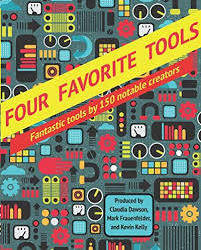
My appearance on Cool Tools (permalink)
This week, I appear on the Cool Tools podcast to discuss my favorite, most indispensible gadgets and services and why I love them.
https://kk.org/cooltools/cory-doctorow-science-fiction-author/
My top picks were my Crkt Snap-Lock knife – a one-handed-opening, lightweight, super versatile pocket knife that I carry everywhere.

https://www.crkt.com/snap-lock.html
I also chose my Chinese OEM underwater MP3 player. I swim every day for my chronic pain maintenance and this is how I make it bearable, getting through 1-2 audiobooks/month.

https://www.amazon.com/exec/obidos/ASIN/B00GWV6GUO/cooltoolsshow-20
My third choice was Libro.fm, the DRM-free, indie-bookseller friendly way to listen to audiobooks. Basically the same catalog as Audible, at the same price, the only difference being that buying from them supports neighborhood booksellers, not Amazon.

It was a really fun! @Frauenfelder and @kevin2kelly are super smart about gadgets.
Here's the MP3:
http://tracking.feedpress.it/link/7810/13374488/779800513-cool-tools-218-cory-doctorow.mp3

UK emergency science panel predicts mass altruism (permalink)
SAGE is the UK Government's Scientific Advisory Group for Emergencies. This is their hour to shine.
They have just published a spectacular, plain-language set of technical reports on the pandemic.
https://www.gov.uk/government/groups/scientific-advisory-group-for-emergencies-sage-coronavirus-covid-19-response
This is the most interesting: "on risk of public disorder."
https://assets.publishing.service.gov.uk/government/uploads/system/uploads/attachment_data/file/873736/08-spi-b-return-on-risk-of-public-disorder.pdf
The expert panel affirms the conclusions of Rebecca Solnit in her indispensable book "A Paradise Built in Hell," a closely researched history of disasters that finds that they are the moment in which people spring to the aid of their neighbors.
https://www.newyorker.com/magazine/2009/10/05/a-paradise-built-in-hell
SAGE's expert panel on disasters: "large scale rioting is unlikely. It is rarely seen in these circumstances. Acts of altruism will predominate, and HMG could readily promote and guide these."
"Where public disorder occurs, it is usually triggered by perceptions about the Government's response, rather than the nature of the epidemic. A perception that Government response strategies are not effective in looking after the public may lead to an increase in tensions."
"Promote a sense of collectivism: All messaging should reinforce a sense of community, that 'we are all in this together.'"
For decades, Britain has been poisoned by Margaret Thatcher's sociopathic maxim, "There is no such thing as society."
It turns out that reality (and pandemics) has a well-known collectivist bias.
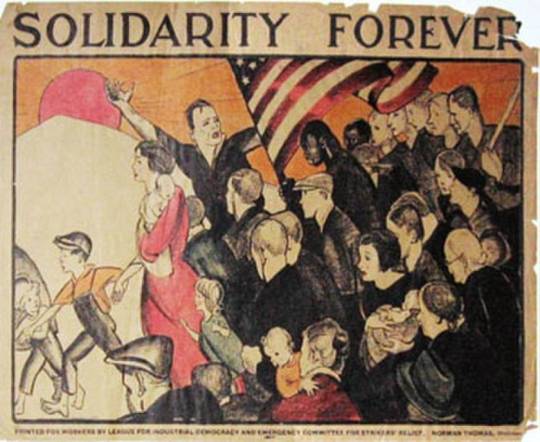
Don't Look for the Helpers (permalink)
I wrote a short essay about how I'm coping with The Current Situation for Our Plague Year, a new podcast from Joseph Fink of Welcome to Nightvale, called "Don't Look for the Helpers".
https://pluralistic.net/2020/03/17/pluralistic-17-mar-2020/#ourplagueyear
Today, PM Press published the essay in a new digital collection, "All We Have Is Each Other."
https://www.pmpress.org/blog/category/blog/all-we-have-is-each-other/
"Assuming things will break down does not make you a dystopian. Engineers who design systems on the assumption that nothing could go wrong aren't utopians, they're idiots who kill people. 'Nothing could go wrong' is why there weren't enough lifeboats on the fucking Titanic."
"Every disaster ends with mutual aid. By definition. That's the only way a disaster can end: with people pulling together. If there's one lesson to take from Mad Max, it's that pulling apart only deepens the crisis, and the it will not end until we pull together."
"I've been telling stories of humanity rising to crisis for decades. Now I'm telling them to myself. I hope you'll keep that story in mind today, as plutocrats are seeking to weaponize narratives to turn our crisis into a self-serving catastrophe."
https://www.pmpress.org/blog/2020/03/19/dont-look-for-the-helpers-by-cory-doctorow/

After the crisis, a program for transformative change (permalink)
The Current Situation has revealed deep cracks in our system: replacing public transit with gig economy drivers who don't get health care or sick leave; the gig economy itself; the lethal inadequacy of private-sector broadband and private-sector health-care, and beyond.
The fact that we can simply abolish data-caps (without networks falling over) and the liquid ban (without planes blowing up) reveals that these supposed existential threats were, in fact, arbitrary, authoritarian, rent-seeking bullshit.
https://pluralistic.net/2020/03/14/masque-of-the-red-death/#security-theater
The people who've spent 40 years convincing us that we're just not free-marketing hard enough continue to insist that all of these problems are merely the result of not having fully dismantled the state (so much for "state capacity libertarianism"):
https://www.bloomberg.com/opinion/articles/2020-03-20/coronavirus-killed-the-progressive-left
They're licking their chops for a 2008-style reboot: eviscerating public services, immiserating workers, fattening plutes and dissolving regulatory safeguards.
It's a playbook developed by Milton Friedman: the scheme to have "ideas lying around" when crisis strikes.
But as Naomi Klein reminds us, the Shock Doctrine cuts both ways. The manifest failures of plutocracy in the Great Depression got us the New Deal and the "30 Glorious Years" of shared prosperity and growth.
https://pluralistic.net/2020/03/17/pluralistic-17-mar-2020/#disaster-socialism
We haven't been idle since 2008. We have "ideas lying around" too. Ideas for a just and resilient society that reorients human life around sustainable and just practices. Motherboard's editorial staff gives us a manifesto for that society, so that this crisis doesn't go to waste:
https://www.vice.com/en_us/article/wxekvw/the-world-after-coronavirus-healthcare-labor-climate-internet
Free and universal healthcare ("healthcare is a basic human right" -B. Sanders)
Abolish ICE and prisons ("ICE is now a public health hazard")
Protect and empower labor ("Without these protections, everyone's safety and health is put at risk")
A healthier climate ("If the 2008-09 financial crash is any indicator, carbon could shoot right back up as soon as the crisis is over")
Fast, accessible broadband ("Community owned/operated broadband networks, long demonized and even prohibited by law are looking better than ever")
Smash the surveillance state ("This pandemic mustn't be used to infringe on the civil liberties and privacy of millions")
Billionaire wealth ("They're sending people to work while jetting off to luxurious doomsday bunkers, getting Covid-19 tests while normal people can't, and also singing 'Imagine' from bucolic getaways.")
Public transit that works ("Congress is poised to prioritize bailing out airlines and the cruise industry before it takes a look at public transit")
The right to repair ("Right-to-repair has become a matter of life and death.")
Science for the people ("We were caught flat-footed by a fixation on 'innovation' and lack of public options")
The future will not be like the past. Whether it is worse or better is our choice to make. It is in our (well-scrubbed) hands.
(Image: Jolove55, CC BY)
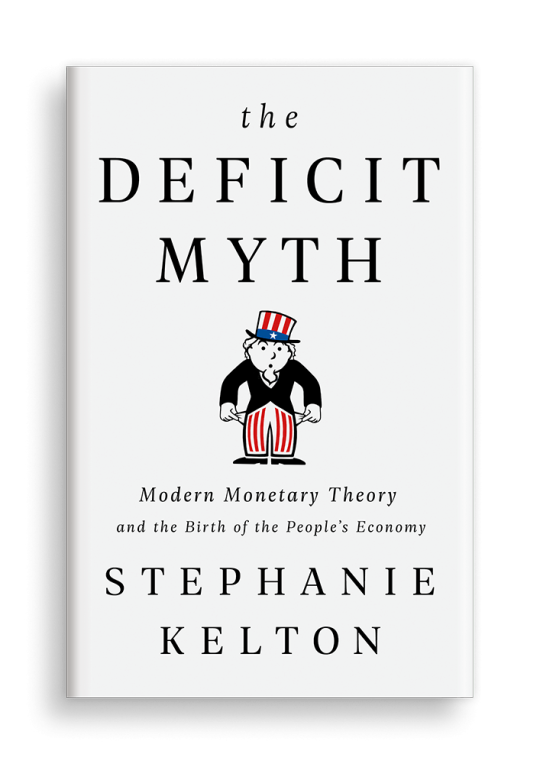
Pandemic stimulus, realpolitik edition (permalink)
I've been thinking a lot about what a covid stimulus package could and should look like, and what the possible failure modes and transformative changes could be. Obviously, there's real risk of inflation if handled wrong, because production has halted, so more money could end up chasing fewer goods. That gets ugly quick.
https://pluralistic.net/2020/03/18/diy-tp/#covid-stimulus
Then there's the risk that we just infuse trillions of no-strings-attached dollars into the finance sector, who use it to make our society even more brittle and unstable by hollowing out reeling companies and grinding down brutalized workers.
https://pluralistic.net/2020/03/19/gb-whatsapp/#peoples-bailout
Writing about this stuff in public makes a lot of Twitter people with "investor" in their bios very, very angry. They want giant bailouts for the companies they own stocks in, not transformative change. They use the neolib tactic of throwing out a lot of jargon to instil a sense of your technical illiteracy. Complexity is a con-artist's go-to tactic, after all – it's why proposition bets are so complicated, so you can't do the odds in your head (see also: craps tables).
But not every economist believes that sociopathy is pareto optimal. Leading lights like Stephanie Kelton, the mother of Modern Monetary Theory, who can go toe-to-toe with oligarch-apologists from the Chicago School, explaining how public debt really works.
Kelton and AOC appeared on this week's Deconstructed podcast with Mehdi Hasan to discuss the true scale of the bailout that will be needed (far more than $1T) to get the economy working again. That number can come down (by lowering working peoples' outgoings through rent/mortgage/student loan holidays, etc). But the lesson of 2008 is that to be credible, stimulus must be transparent and aimed at the public good, not the donor-class.
https://theintercept.com/2020/03/20/deconstructed-podcast-alexandria-ocasio-cortez-coronavirus-economy/
https://dcs.megaphone.fm/FLM7803427023.mp3
Otherwise, Congress risks having its hands tied: it might inject an inadequate and corrupt stimulus that benefits its cronies, then be unable to follow that on with a people's bailout that would help us all.
AOC: "Look at this kind of trash pile of legislation the Republicans have just introduced. I've never seen such a thing in my life of, we're going to give the neediest people less. And we're going to give people who are you know, need help but don't need as much help more."
Kelton: "What people mean when they say, you know, oh, Senator Sanders, you want Medicare for All or you want to make public colleges and universities tuition free, you want to cancel student debt, how are you going to pay for it? Where is the money going to come from? What that means in beltway speak is how are you going to offset all of that spending with new revenue from somewhere else, or by spending less in defense or some other category, the budget?"
"When you do a piece of legislation that's 'paid for,' it means you're putting the 50 billion in and it goes to some parts of the economy, and you're taking 50 billion out of some other parts of the economy so that you're not deficit spending."
"We've been so badly educated to respond to deficits as something that's fiscally irresponsible, reckless. It isn't. The government is committing to dropping dollars into the economy without ripping them right back out again. It's exactly what we want them to do right now."
Kelton's work on Modern Monetary Theory is transformative. Her lectures present both a powerful descriptive account of how money works in the economy and a prescriptive account of how we can use that knowledge to make a better, more prosperous world.
https://www.youtube.com/watch?v=WS9nP-BKa3M
She has a new book about this coming in June, The Deficit Myth. This would be a good time to pre-order it. These are scary times for writers with books about to come out (signed, I have three new books out in 2020).
https://stephaniekelton.com/book/
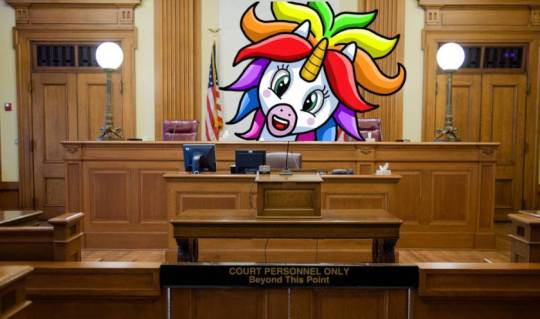
Beautiful judicial snark (permalink)
As Ken "Popehat" White is fond of reminding us, no one snarks quite like a federal judge. And despite being a Trump appointee, Steven C Seeger manages to rip off a couple zingers in this ruling.
http://loweringthebar.net/2020/03/unicorn-case-not-an-emergency.htm
At issue: Art Ask Agency is upset that someone is counterfeiting their unicorn-logo merch, such as this unicorn-scented candle:
https://artaskagency.com/our-licenses/anne-stokes/unicorn-candle/
But Illinois is in covid lockdown, so its case against a bunch of John Doe (alleged) counterfeiters is on hold. Their lawyer has sent a string of motions to the court asking for an emergency hearing so they can proceed, despite the fact that the court clerks are operating on reduced staff and only dealing with matters of the utmost urgency.
The judge is Not Impressed: "At worst, Defendant might sell a few more counterfeit products in the meantime. But Plaintiff makes no showing about anticipated loss of sales. One wonders if fake fantasy products are experiencing brisk sales at the moment."
The judge takes notice of the time a telephonic hearing would consume, "especially given the girth of the Plaintiff's filings."
"Plaintiff argues that it will suffer an 'irreparable injury' if this court does not put a stop to the infringing unicorns and knock-off elves."
"The world is facing a real emergency. Plaintiff is not."
(Image: Karen Neoh, CC BY)
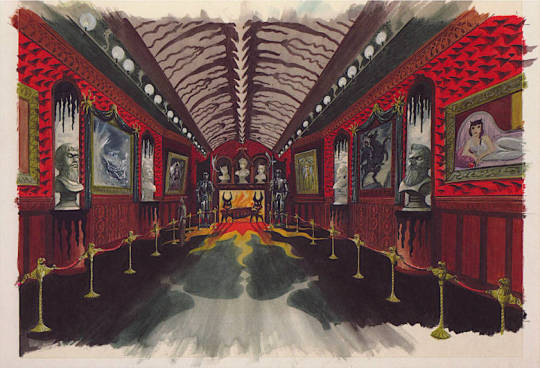
Marc Davis's Haunted Mansion (permalink)
Along with Passport to Dreams Old and New, the Long Forgotten Blog is the best source of information on the history, design, and evolution of Disney theme-parks.
https://passport2dreams.blogspot.com/
But Long Forgotten focuses on a single ride, the glorious, brilliant Haunted Mansion.
The history of the Haunted Mansion was completely upended in late 2019, when Christopher Merritt published his "Marc Davis in His Own Words," a two-volume compendium of journals and interviews with the legendary Imagineer, who was Merritt's mentor.
https://books.disney.com/book/marc-davis-in-his-own-words/
This is probably the best book of Disney/theme-park history ever published, and that's no surprise, as Merritt has already written the definitive history of Knott's Berry Farm:
https://www.angelcitypress.com/collections/authors-christopher-merritt
And Pacific Ocean Park:
https://www.yesterland.com/pacificoceanpark.html
Merritt is an Imagineer, an artist, and a historian, who has direct, lifelong connections with the original Imagineering team. He has unparalleled access, inside knowledge and perspective. So yeah, that is a fucking great book.
Marc Davis was the best character designer in the original Imagineer cohort: he created the Country Bears, the Pirates, and the Haunted Mansion ghosts. He was a spectacular visual gag master, too. And he was one of the (many) legendary Imagineers who had a hand in designing the Haunted Mansion. That ride had so many different iterations, drafts, plans and schemes, and the final product is so wonderful in part because of their remnants.
But Davis actually designed a full-on Haunted Mansion attraction, from start to finish, and those plans are kicking around. Based on those, Long Forgotten has created a narrative account of what it would be like to tour "Marc Davis's Haunted Mansion."
https://longforgottenhauntedmansion.blogspot.com/2020/03/marc-daviss-haunted-mansion.htm
It's…interesting. Davis had some really fun ideas like meeting up with a talking bust (or raven).

And there are great gags (Davis designed the "three-part" stretching portraits, after all).
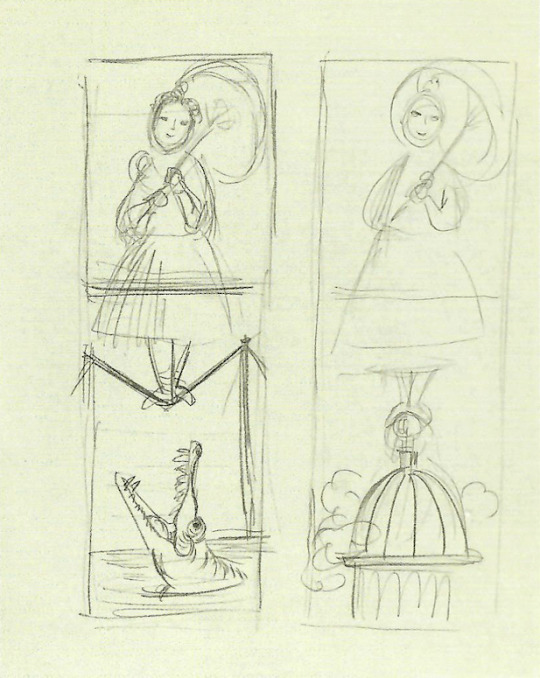
I mean. this would have been so freaking boss.
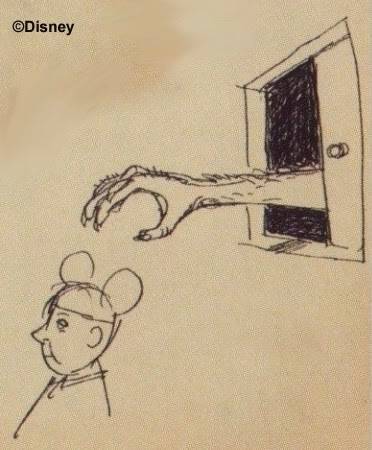
But the real meat is something called "The Most Dangerous Ghost":
"The final picture is perhaps behind black drapes which raise as the ghost host calls out attention to it. As the drapes part we see a painting that has everything in it except a figure. There is perhaps a vague image where the figure should be. The ghost host reacts in a frightened manner. He explains that this is terrible because this is the most dangerous ghost in the mansion. When he climbs out of his picture he mingles with the guests until he has turned one of them into a ghost. He describes the ghost's appearance and its omnipotent powers. He suggests again that everyone should stay in a tight group; this evil ghost loves to pick off stragglers. He suggests that the group be wary of sliding panels, gusts of cold air and etc."
Long Forgotten: "The MDG character undercuts the intellectually sloppy notion that all Davis cared about was making the HM funny."
LF goes on to make a good case that Davis wanted to incorporate many of Rolly Crump's gorgeous "Museum of the Weird" designs into his Mansion.

Davis's seance room seems to flirt with MDG some more: "The presence of the villain ghost makes itself felt and these older retired ghosts are frightened. Whatever we have used to indicate the nearness of the villain ghost would be repeated here."
Davis once planned for a Mansion filled with "working class ghosts" (carpenters, soldiers, boxers, etc). The only ones that survived were the coachmen in the graveyard sequence.
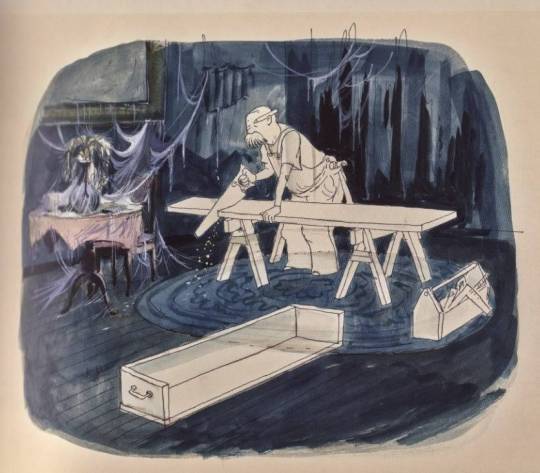
And his bride sequence was very explicit about wedding-night murders, culminating with MDG manifesting amid the guests: "He starts a wild mocking laugh. It clouds up outside. The curtains blow inward. It starts to rain along with thunder and lightning. "Outside we see a figure take form and it moves into the room. The rain comes into the room with the figure and a pool of water forms around its feet."
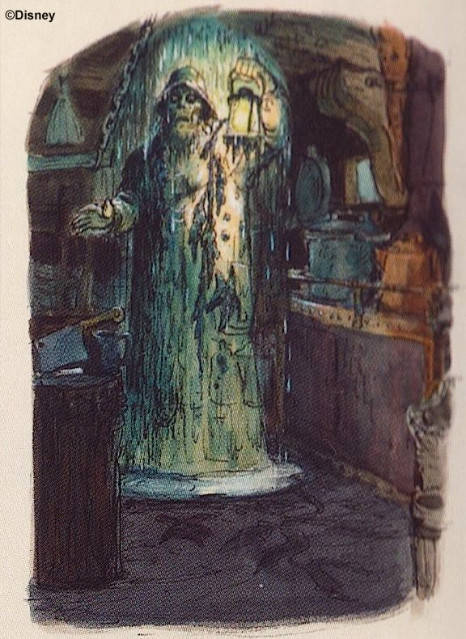
This is gorgeously scary, but as Long Forgotten points out, it has little re-play value (similar to Tomororwland's Alien Encounter): "The gag about the Ghost Host revealing himself as the Most Dangerous Ghost has the obvious disadvantage that it can surprise you only once. Pretty soon everyone knows the 'secret,' and as its usefulness as a genuine shock or scare tactic fades its status as pure camp inevitably increases."
That all said, "We learn what we should already know but sometimes forget: Marc Davis was never an imperious, one-man show. He was a team player. He interacted creatively with the work already done by previous Imagineers, displaying in this outline nothing but respect for what was good in what they had done."

This day in history (permalink)
#15yrsago Disney busts amateur Disneyland tour guide https://web.archive.org/web/20050323133504/http://jimhillmedia.com/mb/articles/showarticle.php?ID=1356
#10yrsago James Randi is gay http://archive.randi.org/site/index.php/swift-blog/914-how-to-say-it.html
#5yrsago Windows 10 announcement: certified hardware can lock out competing OSes https://arstechnica.com/information-technology/2015/03/windows-10-to-make-the-secure-boot-alt-os-lock-out-a-reality/
#1yrago Two arrested for hiding cameras in motel rooms and charging for access to livestreams https://edition.cnn.com/2019/03/20/asia/south-korea-hotel-spy-cam-intl/index.html

Colophon (permalink)
Today's top sources: Ok børge (https://twitter.com/forteller), Beyond the Beyond (http://www.wired.com/category/beyond_the_beyond/).
Currently writing: I've just finished rewrites on a short story, "The Canadian Miracle," for MIT Tech Review. It's a story set in the world of my next novel, "The Lost Cause," a post-GND novel about truth and reconciliation. I've also just completed "Baby Twitter," a piece of design fiction also set in The Lost Cause's prehistory, for a British think-tank. I'm getting geared up to start work on the novel next.
Currently reading: Just started Lauren Beukes's forthcoming Afterland: it's Y the Last Man plus plus, and two chapters in, it's amazeballs. Last month, I finished Andrea Bernstein's "American Oligarchs"; it's a magnificent history of the Kushner and Trump families, showing how they cheated, stole and lied their way into power. I'm getting really into Anna Weiner's memoir about tech, "Uncanny Valley." I just loaded Matt Stoller's "Goliath" onto my underwater MP3 player and I'm listening to it as I swim laps.
Latest podcast: The Masque of the Red Death and Punch Brothers Punch https://craphound.com/podcast/2020/03/16/the-masque-of-the-red-death-and-punch-brothers-punch/
Upcoming books: "Poesy the Monster Slayer" (Jul 2020), a picture book about monsters, bedtime, gender, and kicking ass. Pre-order here: https://us.macmillan.com/books/9781626723627?utm_source=socialmedia&utm_medium=socialpost&utm_term=na-poesycorypreorder&utm_content=na-preorder-buynow&utm_campaign=9781626723627
(we're having a launch for it in Burbank on July 11 at Dark Delicacies and you can get me AND Poesy to sign it and Dark Del will ship it to the monster kids in your life in time for the release date).
"Attack Surface": The third Little Brother book, Oct 20, 2020. https://us.macmillan.com/books/9781250757531
"Little Brother/Homeland": A reissue omnibus edition with a new introduction by Edward Snowden: https://us.macmillan.com/books/9781250774583
16 notes
·
View notes
Text
PRE EXILE ; HALCYON DAYS .
CHAPTER ONE —— TITANOMACHY .
Raging a grand-scale war, Zeus spared no Titans from his thunderous wrath. The only exceptions were Prometheus and his mother, Themis, for they allied themselves with the Gods and Olympians. In the process of war, fire, smoke and hazy orange plumes reigned the sky, colouring the Earth and heavens vibrant. Both sides, fighting with equal-parts fervor and bloodlust, were hard-pressed to retreat, the Olympians’ victory was ultimately secured. Titans were subsequently chained before their wounds could scab over, and imprisoned at Tartarus, a deep abyss of fire and suffering.
Menoetius was a Titan of prideful jest and the mean laughter, not exactly a kind sibling, but the prospect of missing kind hands that curl at tensed shoulders before battle, the confidence of imparted wisdom, builds an ache in Prometheus’ gut. Struck down by Zeus’ blows on Mount Triphyle, the scent of searing flesh at his bolt of decisive lightning. Then, bound, chained and gagged, banished to Tartarus forever, deep abyss of nothing but flame and suffering.
All of it happened fast, too fast; and he, in turn, never fast enough. Atlas’ wise eyes, the hand in his hair, the whisper of half-hearted condolence before he lost him, fingers cupping fruitlessly at the wet dribble of sand into ocean, never to be found again. Eyes drift down to Earth, and then, he imagines the curve of Atlas’ back, sheened with sweat, as the carried the sky upon his shoulders, enduring for eternity, celestial axis to guide the revolution of heavens.
There is a savagery in Zeus’ eyes, rightful providence, that catches Prometheus' breath, caught on the cusp of breaktaken awe and fear.. He thinks, in the moment with great dizziness, that he would never defy the God if he were ever given the chance.
CHAPTER TWO —— THE CREATION OF MAN .
Prometheus has never known the company of such esteemed friendship, certainly not from one as eccentric as Zeus himself. Likely, his trepidation is garnered from his hunched and weary physicality, surreptitiously-harboured remnants of anger for the persecution of his kind radiating from his tightened shoulders, clear as day. It is all too damning, that Zeus knows the weighty promise of approval will crush his remaining hesitation, allow lingering impressions to efface into clear admiration. Still, the trickery and superiority that tensions their relationship is never forgotten, merely set aside for their future ventures
The High Table is an intricately carved tableau, a narcissistic display of each Gods’ respective feats, sinuous and creaking as the marble shifts to accommodate animation. He is fixated, almost, eyes lingering and ears shut, only coming to when Zeus clears his throat, thunder rumbling off in the distance. Holding himself straight with attention, he brushes dark, warm hands upon his tunic, gestures grandly to the table of Gods and Goddesses, eyeing his precious creations with little doubt and ample disdain.
Hera sniffs, a dainty little action that wobbles her nose, “and what are those?”
Prometheus wants to punch her. Instead, he smiles, pained, “they’re my creation. In Gods perfect image, scaled ten to one. Beautiful, no?” Lips curve, happiness widening with the pull of his lips, “I wish to name these beings : humans.”
An interesting murmur starts, the self-absorbed beings. Of course they would pick up interest upon the phrase ‘Gods perfect image’. It was a sales-pitch just waiting to happen. He contains a mischievous smile as they each seem to lean closer, elbows and palms on tables as they curve in like reeds against wind to leer. Unbeknownst to him, Zeus, sitting by him, as guide, as consul, holds a murky gaze, looks upon the humankind with pitying disdain. When Prometheus’ eyes slant to his, in shy expectancy, hoping for approval, his eyes are undecipherable. Considering.
“I have one condition, Prometheus.” The table quietens, faces yielding like a field of blooming flowers in the face of Zeus’ staunch authority, “I will allow these little clay creatures of yours to serve and worship, to love and adore. But you must promise me this: you are never to gift them with knowledge, with Apollo’s literacy or music, or your own foresight.”
“I heed you, Zeus.” The words feel like ashes upon his tongue.
CHAPTER THREE —— TRICKERY AT MEKONE .
The competition is just; or so Prometheus tells himself. Blood and gristle removed from the slain, cooling cadaver of cattle, sorted piously into pile, Prometheus could hardly contain the smile in the face of his artful arrangement. Masterpiece studied by the gold severity of divine eyes, Zeus is lead down his slippery trap, unbeknowingly. Bones crunch, brittled to dust in the angry grip of Zeus’ careless hands.
“Prometheus!” The voice the booms down, rains upon him like blessing. He likes it, the attention provided, the very anger that courses through his pronunciation shakes him. Yet, the jest turns sour. He’s forgotten the malicious streak
“As your divine punishment, I rebuke the privilege of fire from your precious humans. Above all, their developing signs of intelligence are...troubling, to say the least. I fear that their descent has only yet begun, and they drift farther from Olympus’ blessings, daily. You have, too, time and time again, disobeyed me with your visits, your provisions of all sorts of Godly prospects to humankind, but this will be my final say, Prometheus. Friend.” There was nothing sorry in his gaze; nothing friendly either, only a calm, almost heavy judgement in his electric gaze. It’s not exactly a falling out, but the heavy weight of Zeus’ disappointment startles him into cool realization.
The sting of betrayal lay heady in the crux of his nose. Twines, branches, brambles are crunched underfoot as soles traverse the forest, blinding quick in face of his burning anger. How dare he. There was nothing more he loved than his creations, every etch and detail of man’s figure, sculpted and proportioned in Gods’ perfection. He rained a fist down upon the damp Earth, privy to no one, and he fell trees like the whispery ruffles of storm. He would force Zeus’ hand, have him yield.
The dastardly black of night, stars nary a twinkle, bound cloth upon his feet to stifle sound, he eases the marble sheen of Zeus’ doors open, toes the threshold of his doorstep and into the fiery warmth of his grate, alit with a flickering, pluming fire. A hollow reed kindled with dry hay, grass and twigs gripped tightly in hand.
His entrance is swift, but he did not acknowledge Cerberus in his calculations, the beast large and restless as it sleeps uneasy. As soon as he passes fire overhead, it seems to singe the very air above him, and his head shifts to bat the heat cool. As his six eyes snap open, accusative, amber gold, the responsive howl echoes along the walls, and so does the responsive ring of thunder. As his feet pitter down the plated steps, the thunder is right behind him, right on his heels. Only a matter of time now. The reed leaves his hands, hurtling down towards mortalkind. Eyes close. His legs are weak - he finds it in himself to fear, trembling in face of it all.
“Prometheus!” He turns, and his face is alien with the anger. He wonders if this is his penitence, after those years of betrayal, if he would finally reunite with his brother-kind. Smiles.
EXILE ; THE BEGINNING DESCENT .
CHAPTER FOUR —— BANISHMENT .
Zeus would be a better man if he didn’t consider the implications of banishment. There is no forgiveness to beg for this time around. Yet, Prometheus could hardly feel any guilt. What was the reasoning behind rescinding fire, when all the other mortals had so cultivated it too? Pain rises to his eyes, blurs his vision.
The judgement is swift and unemotional, features blank slate as he decrees the sentence. Prometheus cannot breathe. How could things have turned sour so fast? His heart hurt, head pounding, allows Zeus to lead him up the winding mountain path, dumbstruck. Chains, shackled weighty and fast along his limbs, there is no give in the metal, here to stay.
When Zeus passes his eyes over him, the grey slate meeting furor, Prometheus wishes he had something to say. Something witty, or memorable. But he is too emotional, too horrified by Zeus’ ruling, that he can only look up at him, vague conveyance of all the bitter he feels. Maybe Zeus does pick up on it, because as his eyes shutter, there remains a healthy amount of hatred and disgust in them.
He is the last God Prometheus sees in a long, long while.
CHAPTER FIVE —— HERAKLES’ STRIFE .
When he comes to, delirious with pain, his face is angelic, perfect proportion that Prometheus is less concerned with his presence as opposed to the symmetry of features. The likeness of Zeus, He flinches. Hands reach, no words spoken but the latches catch free by those sun-kissed hands and he falls to his knees, to the plinth where his saviour stands.
The midday heat is scouring, and he feels his cavity light from the punishment, organs stripped bare from body as he is hoisted up by armpits, eyes glassy and dull, too agonized to focus. He cannot discern the words emerging from the young man’s mouth, but his lips forms around a damned syllable and tells him all he needs to know - the only one he cherry-picks from the noise, before his consciousness fades.
When he awakes a second time, finally ceasing his erratic drifting in and out of consciousness, the sun has set. He prefers not to look down at himself and study the mess he is. Thankfully, Herakles, he soon learns, provides him with the small mercy of ignorance, too. It is more faithful than ironic, that Zeus’ actions indirectly lead to his own predicament. Though this time, he is more divided upon the matter of morality. There is nothing good or bad that Zeus has done, and he doesn’t know how to feel about that. To not have that judgement, be it good or bad, at his side.
He stares into the heat of warmth, kindled by Herakles himself. Shivers. Hesitantly, he speaks. It is only a while before Zeus will catch up to them, and he would hardly ask for someone, the kin of Zeus himself, no less, to fight for a stranger. He speaks as if he has all the time in the world, for if he hurries his breath would fail and wane.
They spend a long time, sat introspective. He isn’t able to help but realize that there is no contradiction from Herakles. He chuckles, soundless and bitter, he’d never considered fighting for the cause anyway. Zeus would be perfectly happy to leave him dried out and starfished upon the mountain peak for forever and a day. Does he remember him? Forgive him? Questions he asks himself daily. Herakles, though sympathetic, had only saved him as a way to get Zeus to deal with him. He supposed it was better this way.
“Prometheus.” That voice. Eyes close.
POST-EXILE ; STRIPPED OF GRACE .
CHAPTER SIX —— BACK TO NEW REALITY .
There is no remaining warmth in his eyes. Whilst his burn a perpetual fire, Zeus’ eyes are slate cool like that of weaponized mercury, toxic and unforgiving. Unlike his first judgement, there are no tears left to shed.
He quietly agrees, no fanfare, allows Zeus to lead him down to another prison, yet again, of another kind. Is shocked to hear that despite the lack of piety or love for the Gods, Zeus has fostered a liking for those little creatures, well-loved, but ones that he is now merely but a stranger to, toughened and perversed by pandora’s gifts, the terrifying knowledge of war and strife and greed. There is no purpose in despair, because Zeus’ satisfaction of his pain would be the worst thing to allow. So, despite Zeus’ unsubtle and, in hindsight, entitled manner of requesting an apology for having been forced to chain Prometheus to a rock, he keeps his lips stubbornly zipped and amps up Zeus’ rage against better judgement.
Thus, on a lukewarm, unparticular Thursday morning, clouds parting for the warmth of the sun, he falls.
He travels through civilizations, centuries, experiencing the passage of time like a ghostly wanderer, under aliases of many travellers, never settled. Passing wealth along one hypothetical kin to another, he amassed wealth that means nothing to him, relationships that fade to dust in the time it comes to form them. The lure of narcotics and crime and lust.
He learns the ways of survival, to barter and commit and possess in all the ugly, ugly ways possible. Ironic, but never having been exposed to such evils, it makes him doubly hate the horrors that Zeus unleashed upon humanity, and as a consequence, the rest of mortalkind. There is nothing pretty, or perfect about humans or the other mortals that inhabit Earth. The imperfectness he finds here is something that bothers and aches him in the way the perfectness of Gods do. Sometimes, at the late, weakened hours of night, he berates himself, angry and confused and indulged, whether he knew what he was doing. Whether this was a turn, for better rather than worse.
1 note
·
View note
Text
Everything That Happens - Ch6
I'm back! I'm sorry I missed last week with this story, but it was definitely for a good cause because the WONDERFUL, INEFFABLE, AMAZING @nerdherderette was going through the whole story and giving me a lot of things to think about - I'm going to be going back and making some edits over the last few chapters to make them a bit more smooth thanks to her amazing beta skillage! Thank you for your patience ^_^
Read on AO3 from the beginning if you prefer!
“Hi, Harry!” said Colin at breakfast the following day, a big cheerful grin on his face.
Harry couldn’t help but smile back. “Hi, Colin. Sorry I woke you up last night.”
“Oh, that’s fine - I was having a weird dream anyway.” He shuddered, but the darkness that passed over his face was gone in an instant. “Have a good day!”
Harry waved him off and shook his head in amusement, digging into his porridge. Hermione gave him a sly little smile that made him instantly suspicious. “What?”
“Oh… nothing.”
Harry glanced at Ron, who shrugged. He shrugged back. If Hermione wanted to keep a secret, he wasn’t going to get it out of her.
He let his gaze wander over the tables, taking in the dynamics, brittle and fragile under the no-longer enchanted ceiling. The students were making a valiant effort to get back to normal, although there were places that were empty and people notable by their absence. Students whom Harry had never even spoken to had died on May the second, and many more had decided not to return, moving overseas or finishing their studies with private tutors instead.
The Slytherin’s table was now the smallest by far, the students huddling together in little clusters. Harry glanced over to the end of the eighth year table, where their own two Slytherins were sitting, a good foot or two of space between them and the nearest students.
“I don’t know what they were thinking of, coming back here,” Ron muttered, following Harry’s gaze. “Both their dads are in Azkaban, Malfoy’s mum’s under house arrest. What did they think was going to happen, that everyone was going to welcome them back with open arms?”
“Have you considered, Ronald, that they don’t have anywhere else to go? Theo’s effectively an orphan; his mum died when he was in fourth year, and Malfoy… well, would you want to be back there? Where Voldemort was living?”
Ron looked abashed. “How do you even know all that stuff about Nott’s mum?” he asked.
Harry wasn’t listening. He was watching Draco Malfoy rise from the table and slip out of the Great Hall. His white blond hair was somehow darker and lay flat on his head, his eyes were sunken and underlined with dark shadows. He looked like he had in sixth year.
Harry poked at his porridge and felt his heart rate speed up. He wondered what Malfoy had been doing in the third floor corridor last night. Not that there was any reason why he would be… doing anything, just… well, the last time Harry had noticed him sneaking around, it had ended in a war.
But Harry had a new weapon now - he didn’t have to wonder what Malfoy had been getting up to. He could go and find out.
His heart pounding, Harry excused himself from the table and slipped into an empty classroom. He took a deep breath and remembered where he’d been last night, lying in bed, unable to fall asleep. He could picture it in his mind’s eye, he could see the dorm--
-- and suddenly he was there. He sat up in bed, blinking in the darkness, and grinned.
He shoved his glasses on and fumbled for the map. There was Colin Creevey in Gryffindor, already (or still) alive, because in this timeline, Harry had saved him. The timeline in which Colin had died was gone forever; Harry could feel it in that developing sense deep in his mind, a strand cut loose and drifting free, existing only in Harry’s memory. He felt the fierce triumph pound in his blood as he scanned down the map. To his surprise, even though it was hours before Harry would have bumped into Malfoy the last time, his name was already bobbing around on the third floor.
Slinging his invisibility cloak around himself, he slipped out of the makeshift dorms and up the stairs. The corridor was as unused as Harry remembered from his first year, and for the first time, he wondered why there were so many rooms in the castle that never got used.
Strangely, Malfoy’s name wasn’t anywhere near the trapdoor Fluffy had been guarding seven years ago, but sat in the corner of one of the far rooms. Harry crept closer, his hand pressing flat against the half-open door.
“Who’s there?” Malfoy snapped, leaping to his feet and swinging his wand in an arc across the room. Harry froze, his eyes screwed up tight, berating himself for his carelessness.
“I know you’re there,” Malfoy said. He sounded like he was imitating his past self, like he’d forgotten how to be intimidating. The tip of his wand was shaking, and as Harry looked closer, he thought his lip might have been trembling too.
Malfoy slumped back in the corner, his hands coming up to clutch at his hair, his whole body folding in on itself. All of a sudden, Harry was reminded of the girls’ bathroom in sixth year, Malfoy’s despair, and the last time he went sneaking up on him.
Shame flooded through him. He’d wanted to use this gift to make things better, to change things, and here he was, making the same mistakes all over again.
Before he could think, he’d slipped the cloak off. “Malfoy?” he called softly, stepping into the room.
Malfoy leaped to his feet again, his eyes hard. “Potter,” he spat. “What do you want? Come to slice me up again?”
“Hey, you tried to-” Harry took a deep breath and closed his eyes. “No.”
“Well… what do you want, then?”
Harry tugged at his hair. “Uh… well, I couldn’t sleep. So I was wandering around.” He shuffled his feet a bit more. “Um, are you OK?”
Malfoy laughed, high-pitched and absolutely without humour. “I’m peachy, Potter,” he said, spreading his arms.
“What are you doing here?” asked Harry, wandering further into the room. “I don’t think we’ve ever had lessons in here.”
Malfoy snorted. “Why do you think I chose it?”
Harry looked at him, his head to one side. He wasn’t sure Malfoy was going to clarify, but after a moment he spoke, his arms crossed tightly over his chest. “You weren’t here last year, Potter,” he said. “Every room… they tortured people in every classroom. They made us--” He cut himself off and cleared his throat sharply. “If you’ll excuse me…” and he marched past, his shoulder thumping Harry’s on the way out.
Harry took one more look around the classroom, at the corner Malfoy had been huddled in, and felt shame prickle once more at the back of his mind as he released the thread of the past and opened his eyes to another empty classroom hours away.
***
The first time Harry went back in time to try and save Tonks, to try and argue with her, convince her to go back to her baby, she just smiled and patted him on the cheek before running off. When he went back again, fighting through the spiders and veering around the grounds to search for her and Lupin, he wasted so much time that he nearly forgot to get to the Shrieking Shack.
He lay in the darkness of his room, heart beating fast, the grief and terror and panic of that night no less intense than it had been the first time.
He rolled out of bed and wandered the castle again, his head aching dully with the pain leftover from his scar. The moon shone through the windows on the south wing, and Harry leaned out, watching his breath condense in the chilly autumn air.
Soft footsteps had him glancing up to see Draco Malfoy walking along the corridor, his head bowed. Harry watched him, wondering at the difference in his demeanour these days, the way he crept quietly from room to room and sat in silence next to Theo to complete his work. No sarcastic comments, no mockery nor cruel laughter. It was like he’d been hollowed out.
It felt familiar.
“Hey,” he said softly, and Malfoy startled to a stop, looking up cautiously like he hadn’t seen Harry there, or he’d been hoping Harry wouldn’t see him. Harry grasped for conversation, half-wondering what the hell he was doing. “Um. How’s your mum? Is she OK?”
“Why do you want to know?” Malfoy asked, his tone a mix of defiant and curious.
Harry shrugged. “I heard she was stuck there. In your house. I thought… you know she saved me, right?”
Malfoy frowned.
“She lied to Voldemort. Said I was dead when she knew I wasn’t. I mean… I guess it’s possible he actually wouldn’t have been able to kill me then, but she didn’t know.”
Malfoy walked slowly, cautiously, until he stood at the window beside Harry. Harry watched him out of the corner of his eye, saw how his thin wrists rested delicately on the windowsill, the bumps of his collarbone sticking out of his shirt. How his face looked less sunken, less bruised in the moonlight.
“She’s strong,” Malfoy said at last. “Much stronger than me. Or Father, for that matter. She’s always done what was needed for the good of the family.”
Harry nodded. For a moment they stood side-by-side and watched the thestrals wheel over the forest.
“Goodnight, Potter,” said Malfoy, his hand trailing along the windowsill as he stepped back, and he left Harry to the peace that had taken up temporary camp in his mind.
OK from now on, the next few chapters are ROUGH. I'm not kidding, it starts to get happy around chapter 11. I am not a kind person to Harry or Draco. Or... anyone... There will be MCD BUT I swear it’s only temporary - I have chosen not to use archive warnings on AO3 because this is a time travel fic and it WILL end up a fix-it. But there's A LOT of bad stuff between now and then. If you need more detail I'll be more than happy to provide <3
#My writing#Everything That Happens (Is From Now On)#drarry#Harry Potter#angst#Emotional Hurt/Comfort
6 notes
·
View notes
Note
[Lorcan and Beth] ❤♡❥ღ💕💘💝💓💌💟💙💚💜💛
Heart Eyes || -Selectively- Accepting

❤: who is more affectionate in public? in private?The biting. The scratching. The ambushes in alleys, the limping home afterwards to patch up the wounds. Every inch was a bloody war waged with little care for Collateral Damage, a phrase Beth has always hated. Whatever cruel savagery Lorcan came up with, she did her best to outdo him, feeling the magick in her veins boiling over.And behind closed doors? If anything, it’s worse. It’s brutal. There’s no affection in any sense of the word, she isn’t built that way any more and he never had been. Things are thrown. Words are snarled. If anything, there’s even less respect between them.
There was a term for it back during the age of sail… No Quarter Asked or Given.And for the life of her, she can’t make herself regret it.
“I…don’ unnerstan’ da question.”
♡: who is the bigger romantic openly? secretly?
A feral smile graces her lips.Romantic. As in Legions locusting their way across unconquered territories, decimating entire swathes of people, taking spoils in the form of exotic beasts and gold and slaves and wives, burning and salting the land as they go to ensure nothing rises up again in its place, supplanting the native culture with that of the Empire...oh yes, Lorcan is far more romantic than Beth.
But she’s always been a fast learner and he’s not getting away completely unscathed any more, is he? That leering smile of his is becoming a little harder to come by.
“I mean…depends onna day, really.”
❥: who is more likely to plan something big for valentine’s day?
For Valentine’s day, he’d gotten her an box of candy hearts. More correctly it was a box of human hearts cut into bite sized bits and dipped in some kind of spicy, dark chocolate coating.Andy was tasked with the manhunt for the killer who left no less than twenty heartless bodies scattered across New York City. After weeks of no leads, a special unit of the FBI had come in to take over the investigation. She only belatedly realised it had been a Technocratic cabal, and that their mission had been to sanitise the situation. At least that was the rumour. She almost had to laugh because they’d never find him. And her brother looked incompetent.
Maybe that was the best gift of all.
And what did she give him in return? She kept his secret.
“Absolutely Lorcan.”
ღ: who is more likely to initiate hand-holding in public?
She snatches at his wrist. Coils fingers around it like vines and holds it in an iron grip. A flick of her thumb and there’s a razor thin slash across the softer skin and his blood flows free. There’s a moment of surprise in his eyes before they narrow on her and he bares his teeth. A promise threat to be consummated at a place and a time of his choosing. She doesn’t bother to apologise.
She soaks her fingertips in his viscera and makes a design on the brick wall. Something eldritch and arcane in a language that…wasn’t. He’s intrigued and she knows it. And when she pushes on the last brick and the wall dissolves into green mossy woods that haven’t existed in more centuries than even he can fathom, she knows she’s got him completely. So what does she do?
She digs her claws in deeper. Until they’re deflected by the actual bones in his arm before she rips them away.And then? Then she slips through the portal…and she runs.“Dis one gonna hafta say is really all me.”
💕: who is more likely to make huge declarations of love in front of other people?
She almost chokes on the word. She’s sure if he were in her place…but no, he wouldn’t have allowed such an interrogation. What they have…what they do isn’t love. It’s not even close. It’s…necessary. It’s nature at it’s darkest aspect, the survival of the fittest, and they haven’t yet figured out which one was going to walk away, and which one wasn’t.“Nex’ question.”💘: who developed a crush on the other first?
She can’t quite remember. It’s like waking up from a vivid dream but the second your eyes open it all starts to fall away until all that’s left are the emotional impressions and none of the imagery. But she’s sure that the accusation was that Lorcan had been born out of the loss…of a woman she might have been lifetimes ago. That he’d been a consolidation of agony and grief and a rage so bright, so pure, that it threatened to destroy everything around it. But Beth? She knows that’s a lie. A beautifully and tragically created one. “I guess ya could say…him.”
💝: who spends more time (possibly overthinking) what presents to get the other?
Again, she laughs. What do you give a god when you worship…nothing. When your belief in all things has thinned so much that you’ve become an impenetrable island of your own making? He leaves her ever increasingly disturbing gifts, usually of the organic and very much bloody kind. She leaves him new scars without a thought. And what she really wants from him? He withholds. Toys with the promise of it. Enraptures her with the idea of just how easy, just how quick he can make it all…then dances away before she blinks.
He makes her scream.Someday, she’s going to make him cry.“We both do, in our own ways.”
💓: who initiates most physical contact?
It happens. Every. Single. Time. The second he gets a chance, he slips in behind her. Cuts into the hinge of her jaw with claw or fang before running his tongue along the brittle edges of her and up to her ear. His breath hot and damp like a tropical storm waiting to happen. Pushing. Always pushing. Trying to get a rise out of her and she never fails to disappoint him.
And for her part? She’s learned how to cut and run, both figuratively and metaphorically. Guerrilla tactics because she can’t stand toe to toe with him despite all of her magick. As he likes to point out…she isn’t an Oracle yet, and he doesn’t have to obey a damn thing. So she gets as close as he lets her and uses tricks. Poison here. Cold iron there. Her own natural fangs and claws honed to razor sharpness.
And sometimes… well, anomalies happen. The time she soothed a palm across his back because his grief was more painful than anything she could do. The time he watched over as she slept off the worst effects of someone else’s assault, and feathered his fingers through her hair.
“Take turns, really. Maybe da mos’ normal kine about us, really.”
💌: who is more likely to send cutesy texts to the other?
Luka shows up on her doorstep, half drunk and half maudlin. There’s new bruises. There’s cuts and healing bones. He’s exhausted and doesn’t put up a fight when she lets him in ~some day, he’ll use the door~ and she can’t help but wonder if he uses the fire-escape because the rickety old thing is technically cold iron. She peels his shirt off slowly and trails her fingers along the wounds which some are already half healed. She patches up what isn’t and narrows her eyes behind his back, as she’s staunching a particularly deep cut. To anyone else, these would look like self-inflicted wounds. She knows better.And the longer she ignores him, the worse it’s going to get.“Uhm. I guess…you could say it’s Lorcan.”
💟: who spends time reading their zodiac compatibilities?
“Seriously? For reals?! Yeah, go ahead. Make one single moon joke. I dare you.”💙: who is more protective?
‘Lorcan, please.’He was going to do it. He was actually…going…to do it.Her heart squeezed itself in her chest and she couldn’t draw a breath.
He hunkered down over the edge of the roof, one arm extended outward. From his tenuous grasp, his claws sank into her brother’s throat, and Andy dangled at his whim, hands clutching desperately at Lorcan’s forearm. Andy’s face was turning shades that she couldn’t even begin to describe, the veins in his brow pulsing with adrenaline and for the first time she can remember… there was genuine fear in his bloodshot eyes.
‘Jus’…pu’ him back onna roof, please…ya no can…’For a moment he turns his head back over his shoulder. Glares at her with a madness in his eyes that surpasses anything she has seen before. They gleam lambent in the moonlight as he snarls at her, strands of saliva spanning the space between his fangs.
‘Please? Jus’ dis once. F’ me?’
She’s absolutely certain he’s going to let go and this time nothing she can do will keep her brother from splattering over the pavement seven storeys below.That multitude of voices he speaks with sends ice down her spine. She barely catches the words over the choking sounds Andy’s making again.
‘Ye e'er be touchin’ ..e'er be lookin’ at ‘er any way bu’ proper princlin’…oi’ be givin’ ye o’ repeat o’ who burned ye kingdom an’ e'erd'in’ ye loved ta d'ground around ye corpse.’Beth shivers.“Definitely Lorcan.”
💚: who tends to get sick more often? who is better at taking care of the other?
The moon’s turned again, hiding its light from the world. The tides are at their lowest, sea and blood alike, and he’s fallen victim of his own melancholy. He never talks about himself in these moments, but what is otherwise so terrible and fierce, grows thoughtful and full of sorrow for these three nights. She doesn’t have to look at the sky beyond his hollow to know this. And what can she do but sit there quietly. Let him rest his head in her lap and stroke those fiery strands away from his face. This is the closest that Lorcan gets to sleeping, to dreaming, all of him curled up protective of his own ribs and internal organs, eyes barely slitted open and surely unseeing.
It’s not a sickness either, but maybe it is. A malady of the mind. Whatever it is, she’ll watch over him those nights. And she won’t speak of it afterwards.“Me.”
💜: who said “i love you” first? or, if neither has said it yet, who is more likely to say it first?
“He calls me Beth.”
💛: who believes in soulmates?
The door slams open. It makes the Man in White’s face pale because there was no alarms. No screaming. No sound of chain-guns firing through the corridors. He starts to stand up and in a blur of motion, faster than her eyes can track, there’s a flash of shadow. A slick, wet sound that ends in a gurgle.The Man in White is now soaked crimson, and some of the arterial spray splashes across her face. She watches almost dispassionately as the body falls in two separate pieces.
For just a split second, she thinks he’s actually going to leave her there. The leer on his maw suggests it, dripping red and wide in a close approximation of a smile.
“Raicleach.”She narrows her eyes.“Maugrim.”
Primium shackles were designed to bind the changing breeds. To ward off ghosts and hamper fae. To counter a mage’s Sphere Magick and prevent them from working their will. They weren’t meant to be proof against the divine.She rubs at the raw flesh of her abraded wrists.
“What took you so long?”“Were ye poi'nin’ o'way d'loss o'me?””No.”“Good. Now, move yer arse, woman.”

#whosxafraid#Shadow Wolf|Lorcan Mac Lugh#The Darkening of the Light|Lorcan and Beth#A Grim AU Faerytale#Pretty much none of this is safe for work#Read at your own peril
0 notes
Photo
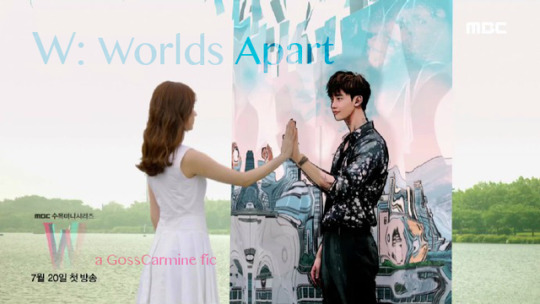
NOTE: I did not mean to post this here, but I’ll keep it and add: new blog is @bygosscarmine! Technical woes with @gosscarmine have made this necessary. T_T Will update you when the blog is ready, but meanwhile...you might find something fun there now...
Worlds Apart - Chapter Four
The Case Unfolds From Both Sides (1193)
find earlier chapters here: [link]
a W: Two Worlds revision-fic
Apparently, she'd been gone for hours. Her father had come back in the front door some time ago--not smelling significantly of alcohol, but weirdly smelling of bleach. Soo Bong had been telling him about how they'd been worrying, only to discover she was gone.
"I can't explain now," she said, shaky. "I think I know what's going on, though."
Soo Bong was a bit of an otaku, but he was more sensibly-minded than many wannabe comics writers. He read the tension in her voice and volunteered to drive her home. Her dad seemed to have gone to sleep, so they locked up and left. She promised to talk to him in the morning.
#
Chul was gazing at the bank of flowers he'd been sent, more meditative than anything, when So Hee glided in. He grinned at her, and she lifted an eyebrow.
"While I have been single-handedly running your company, you have nothing better to do than gloat over your flowers, I see."
"Actually," he said, with dignity, "I've been seriously considering the future."
"If you're considering that, I think I'll have Secretary Go send over some cases for you to work on."
Do Yoon chuckled from where he had gotten comfortable in the VIP room's sitting area.
"If there was anything really interesting happening at the office I know you would have told me," Chul said. "But I'd be happy to take on a little work. What brings you here today?"
"What, a friend can't come visit the invalid?"
She sat (or rather, perched lightly) on the end of his bed.
"You were here every day for a while. Lately you've gotten back to normal routine, and that's great, so I don't think you've come just for a social call."
The briefest moment of annoyance showed, then she just rolled her eyes, and said, "Fine. I wanted to ease into it, but we've finally got the results back. Bad news; all of that woman's information is bogus. The facial recognition software didn't uncover anything, either."
"It's still experimental," Chul said automatically, but his mind was running along the track of what So Hee had said about his mysterious savior. Earlier this week, she'd given the same kind of report on his equally mysterious would-be murderer. "Did they run a check for any lapsed female surgeons who might be underground?"
"Yes, you mentioned that early on. Though I'm not surprised you don't remember, you were still pretty heavily medicated."
Her voice went gentle, though So Hee was usually a chic girl who kept feelings to herself. Chul felt a twist of guilt, briefly. So Hee cared about him, even though their brief romance had been as painful as it had been disastrous. Neither of them found being open about their inner thoughts easy, and while on paper they worked as a power couple, the reality was the opposite.
"Thank you," he said. "I'll continue to pull on some of those threads, but for now it's not a major concern for the company. Anything new in the Alpha Case?"
Amazing how easily he was able to refer to it, with a case title to make it impersonal.
"Nothing new," she said, equally breezy. "But there is a pretty good development in your infrared camera redesign. The Police Chief is impressed, and thinks if he puts in a good word he can get a developer to take on manufacturing it."
"We'll have to talk with Lawyer Kim about whether we want to get an an outside manufacturer involved," Chul said, "and whether we'd make it available to the police through a second party."
"He could come and have a meeting with you here, if you wish."
"I'm hoping to be out by the end of the week."
"If you don't think the delay will matter, that's fine."
Chul looked hard at her. "Do you think rushing to have a meeting--where my attorney will actually see me in hospital robes rather than just hear I'm in recovery after an accident--will be better for business?"
She gave a short, brittle laugh, and conceded. She left soon after, and Chul drew out a much worn notebook from under his covers. After many years of almost nothing to add to this personal record of the Alpha Case, he now at least had more questions to write down.
"Kang Chul," said Do Yoon, surprising him, "you know I admire you for your perseverance."
"Yes?"
"But I think sometimes you could do with a little less intensity and a little more feeling."
"If you're talking about So Hee," Chul said drily, "I'm never going to date her. You can feel free to ask her out."
Do Yoon probably knew as much as anyone what had gone on with So Hee, but steadfastly pretended not to. As Chul expected, the suggestion made Do Yoon blush, and busy himself in yesterday's paper again.
Chul once again found his thread of thought.
Attacker: two? One solid, one without substance.
He had always had unusually keen senses. It had made him miserable as a boy, but when he'd honed it for accuracy in shooting he'd also discovered a method of training that gave him an edge in many areas. His hearing being acute meant he was able to nearly play back a given moment and analyze it. The strangeness of that day with the attacker had not been just the hollow blur where a face should be. In calmer moments of reflection, he realized that there had been no sound. No breath, no movement of cloth. When he'd gone into that alley, pressing away from that locus he usually followed without question, his senses had seemed similarly muffled. He suspected it was because there had been no stimulus. Why that was, he couldn't yet say.
He had written down exacting reports of those moments, and could only try to shake the pieces together and sift them out again to find answers.
He did not really remember the woman who had intervened after he had been stabbed--he couldn't justify, yet, his certainty. But he was sure he had seen her that day when, as if transported, he arrived in the wrong hospital lobby, where she had been talking with a man about him and So Hee.
"Why is she the one you want to track down so badly?" So Hee had asked, when he was coming out of the medication haze. "Do you think she's partly responsible? I mean, she did some serious damage, but the doctors all agree it was a measure taken to save your life, and it probably did."
"I think she's the key to my life," he'd said.
So Hee had taken that to be a melodramatic statement about his gratitude.
However, he was being literal. When he had looked at her, his bones had seemed to hum. Similar to the way the attacker with the knife had made him icy--at a level beyond emotion.
Something strange was happening, and he couldn’t explain it away. In an investigation, if the common-sense answer was impossible, the next thing to examine was the improbable.
6 notes
·
View notes
Photo
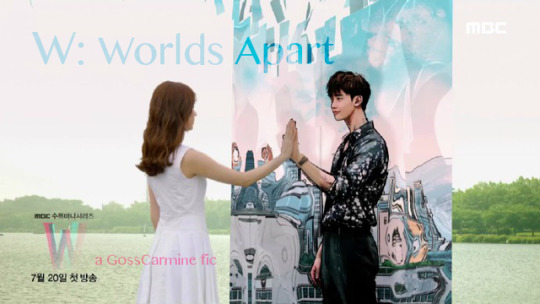
Worlds Apart - Chapter Four
find earlier chapters here: [link]
a W: Two Worlds fix-it fix (Oh Yeon Joo x Kang Chul) -
rated T for now–some disturbing images
The Case Unfolds On Both Sides (1193 words)
In which Oh Yeon Joo returns to her world with a thump, Kang Chul contemplates his data, and the people around them are slightly baffled all round
Apparently, she’d been gone for hours. Her father had come back in the front door some time ago–not smelling significantly of alcohol, but weirdly smelling of bleach. Soo Bong had been telling him about how they’d been worrying, only to discover she was gone.
“I can’t explain now,” she said, shaky. “I think I know what’s going on, though.”
Soo Bong was a bit of an otaku, but he was more sensibly-minded than many wannabe comics writers. He read the tension in her voice and volunteered to drive her home. Her dad seemed to have gone to sleep, so they locked up and left. She promised to talk to him in the morning.
Chul was gazing at the bank of flowers he’d been sent, more meditative than anything, when So Hee glided in. He grinned at her, and she lifted an eyebrow.
“While I have been single-handedly running your company, you have nothing better to do than gloat over your flowers, I see.”
“Actually,” he said, with dignity, “I’ve been seriously considering the future.”
“If you’re considering that, I think I’ll have Secretary Go send over some cases for you to work on.”
Do Yoon chuckled from where he had gotten comfortable in the VIP room’s sitting area.
“If there was anything really interesting happening at the office I know you would have told me,” Chul said. “But I’d be happy to take on a little work. What brings you here today?”
“What, a friend can’t come visit the invalid?”
She sat (or rather, perched lightly) on the end of his bed.
“You were here every day for a while. Lately you’ve gotten back to normal routine, and that’s great, so I don’t think you’ve come just for a social call.”
The briefest moment of annoyance showed, then she just rolled her eyes, and said, “Fine. I wanted to ease into it, but we’ve finally got the results back. Bad news; all of that woman’s information is bogus. The facial recognition software didn’t uncover anything, either.”
“It’s still experimental,” Chul said automatically, but his mind was running along the track of what So Hee had said about his mysterious savior. Earlier this week, she’d given the same kind of report on his equally mysterious would-be murderer. “Did they run a check for any lapsed female surgeons who might be underground?”
“Yes, you mentioned that early on. Though I’m not surprised you don’t remember, you were still pretty heavily medicated.”
Her voice went gentle, though So Hee was usually a chic girl who kept feelings to herself. Chul felt a twist of guilt, briefly. So Hee cared about him, even though their brief romance had been as painful as it had been disastrous. Neither of them found being open about their inner thoughts easy, and while on paper they worked as a power couple, the reality was the opposite.
“Thank you,” he said. “I’ll continue to pull on some of those threads, but for now it’s not a major concern for the company. Anything new in the Alpha Case?”
Amazing how easily he was able to refer to it, with a case title to make it impersonal.
“Nothing new,” she said, equally breezy. “But there is a pretty good development in your infrared camera redesign. The Police Chief is impressed, and thinks if he puts in a good word he can get a developer to take on manufacturing it.”
“We’ll have to talk with Lawyer Kim about whether we want to get an an outside manufacturer involved,” Chul said, “and whether we’d make it available to the police through a second party.”
“He could come and have a meeting with you here, if you wish.”
“I’m hoping to be out by the end of the week.”
“If you don’t think the delay will matter, that’s fine.”
Chul looked hard at her. “Do you think rushing to have a meeting–where my attorney will actually see me in hospital robes rather than just hear I’m in recovery after an accident–will be better for business?”
She gave a short, brittle laugh, and conceded. She left soon after, and Chul drew out a much worn notebook from under his covers. After many years of almost nothing to add to this personal record of the Alpha Case, he now at least had more questions to write down.
“Kang Chul,” said Do Yoon, surprising him, “you know I admire you for your perseverance.”
“Yes?”
“But I think sometimes you could do with a little less intensity and a little more feeling.”
“If you’re talking about So Hee,” Chul said drily, “I’m never going to date her. You can feel free to ask her out.”
Do Yoon probably knew as much as anyone what had gone on with So Hee, but steadfastly pretended not to. As Chul expected, the suggestion made Do Yoon blush, and busy himself in yesterday’s paper again.
Chul once again found his thread of thought.
Attacker: two? One solid, one without substance.
He had always had unusually keen senses. It had made him miserable as a boy, but when he’d honed it for accuracy in shooting he’d also discovered a method of training that gave him an edge in many areas. His hearing being acute meant he was able to nearly play back a given moment and analyze it. The strangeness of that day with the attacker had not been just the hollow blur where a face should be. In calmer moments of reflection, he realized that there had been no sound. No breath, no movement of cloth. When he’d gone into that alley, pressing away from that locus he usually followed without question, his senses had seemed similarly muffled. He suspected it was because there had been no stimulus. Why that was, he couldn’t yet say.
He had written down exacting reports of those moments, and could only try to shake the pieces together and sift them out again to find answers.
He did not really remember the woman who had intervened after he had been stabbed–he couldn’t justify, yet, his certainty. But he was sure he had seen her that day when, as if transported, he arrived in the wrong hospital lobby, where she had been talking with a man about him and So Hee.
“Why is she the one you want to track down so badly?” So Hee had asked, when he was coming out of the medication haze. “Do you think she’s partly responsible? I mean, she did some serious damage, but the doctors all agree it was a measure taken to save your life, and it probably did.”
“I think she’s the key to my life,” he’d said.
So Hee had taken that to be a melodramatic statement about his gratitude.
However, he was being literal. When he had looked at her, his bones had seemed to hum. Similar to the way the attacker with the knife had made him icy–at a level beyond emotion.
Something strange was happening, and he couldn’t explain it away. In an investigation, if the common-sense answer was impossible, the next thing to examine was the improbable.
3 notes
·
View notes
Text
Dictators Last stand
It has been a good decade for dictatorship. The global influence of the world’s most powerful authoritarian countries, China and Russia, has grown rapidly. For the first time since the late nineteenth century, the cumulative GDP of autocracies now equals or exceeds that of Western liberal democracies. Even ideologically, autocrats appear to be on the offensive: at the G-20 summit in June, for instance, President Vladimir Putin dropped his normal pretense that Russia is living up to liberal democratic standards, declaring instead that “modern liberalism” has become “obsolete.”Conversely, it has been a terrible decade for democracy. According to Freedom House, the world is now in the 13th consecutive year of a global democratic recession. Democracies have collapsed or eroded in every region, from Burundi to Hungary, Thailand to Venezuela. Most troubling of all, democratic institutions have proved to be surprisingly brittle in countries where they once seemed stable and secure.Stay informed.In-depth analysis delivered weekly.Sign UpIn 2014, I suggested in these pages that a rising tide of populist parties and candidates could inflict serious damage on democratic institutions. At the time, my argument was widely contested. The scholarly consensus held that demagogues would never win power in the long-established democracies of North America and western Europe. And even if they did, they would be constrained by those countries’ strong institutions and vibrant civil societies. Today, that old consensus is dead. The ascent of Donald Trump in the United States, Matteo Salvini in Italy, and Jair Bolsonaro in Brazil has demonstrated that populists can indeed win power in some of the most affluent and long-established democracies in the world. And the rapid erosion of democracy in countries such as Hungary and Venezuela has shown that populists really can turn their countries into competitive authoritarian regimes or outright dictatorships. The controversial argument I made five years ago has become the conventional wisdom.But this new consensus is now in danger of hardening into an equally misguided orthodoxy. Whereas scholars used to hope that it was only a matter of time until some of the world’s most powerful autocracies would be forced to democratize, they now concede too readily that these regimes have permanently solved the challenge of sustaining their legitimacy. Having once believed that liberal democracy was the obvious endpoint of mankind’s political evolution, many experts now assume that billions of people around the world will happily forgo individual freedom and collective self-determination. Naive optimism has given way to premature pessimism.If the past decade has been bad for democracy, the next one may turn out to be surprisingly tough on autocrats.The new orthodoxy is especially misleading about the long-term future of governments that promise to return power to the people but instead erode democratic institutions. These populist dictatorships, in countries such as Hungary, Turkey, and Venezuela, share two important features: first, their rulers came to power by winning free and fair elections with an anti-elitist and anti-pluralist message. Second, these leaders subsequently used those victories to concentrate power in their own hands by weakening the independence of key institutions, such as the judiciary; curtailing the ability of opposition parties to organize; or undermining critical media outlets. (By “populist dictatorships,” I mean both outright dictatorships, in which the opposition no longer has a realistic chance of displacing the government through elections, and competitive authoritarian regimes, in which elections retain real significance even though the opposition is forced to fight on a highly uneven playing field.)According to the new orthodoxy, the populist threat to liberal democracy is a one-way street. Once strongman leaders have managed to concentrate power in their own hands, the game for the opposition is up. If a significant number of countries succumb to populist dictatorship over the next years, the long-term outlook for liberal democracy will, in this view, be very bleak.But this narrative overlooks a crucial factor: the legitimacy of populist dictators depends on their ability to maintain the illusion that they speak for “the people.” And the more power these leaders concentrate in their own hands, the less plausible that pretense appears. This raises the possibility of a vicious cycle of populist legitimacy: when an internal crisis or an external shock dampens a populist regime’s popularity, that regime must resort to ever more overt oppression to perpetuate its power. But the more overt its oppression grows, the more it will reveal the hollowness of its claim to govern in the name of the people. As ever-larger segments of the population recognize that they are in danger of losing their liberties, opposition to the regime may grow stronger and stronger.The ultimate outcome of this struggle is by no means foreordained. But if the past decade has been depressingly bad for democracy, the next one may well turn out to be surprisingly tough on autocrats.
In North America and western Europe, populist leaders have gained control of the highest levers of power over the course of only the past few years. In Turkey, by contrast, Recep Tayyip Erdogan has been in power for nearly two decades. The country thus offers an ideal case study of both how populist dictators can seize power and the challenge they face when increasingly overt oppression erodes their legitimacy.Erdogan became prime minister in 2003 by running on a textbook populist platform. Turkey’s political system, he claimed, was not truly democratic. A small elite controlled the country, dispensing with the will of the people whenever they dared to rebel against the elite’s preferences. Only a courageous leader who truly represented ordinary Turks would be able to stand up against that elite and return power to the people.He had a point. Turkey’s secular elites had controlled the country for the better part of a century, suspending democracy whenever they failed to get their way; between 1960 and 1997, the country underwent four coups. But even though Erdogan’s diagnosis of the problem was largely correct, his promised cure turned out to be worse than the disease. Instead of transferring power to the people, he redistributed it to a new elite of his own making. Over the course of his 16 years in power—first as prime minister and then, after 2014, as president—Erdogan has purged opponents from the military; appointed partisan hacks to courts and electoral commissions; fired tens of thousands of teachers, academics, and civil servants; and jailed a breathtaking number of writers and journalists.Even as Erdogan consolidated power in his own hands, he seized on his ability to win elections to sustain the narrative that had fueled his rise. He was the freely elected leader of the Turkish republic; his critics were traitors or terrorists who were ignoring the will of the people.
Although international observers considered Turkey’s elections deeply flawed, and political scientists began to classify the country as a competitive authoritarian regime, this narrative helped Erdogan consolidate support among a large portion of the population. So long as he won, he could have his cake and eat it, too: his ever-tightening grip on the system tilted the electoral playing field, making it easier for him to win a popular mandate. This mandate, in turn, helped legitimize his rule, allowing him to gain an even tighter grip on the system.More recently, however, Erdogan’s story of legitimation—the set of claims by which he justifies his rule—has begun to fall apart. In 2018, Turkey’s economy finally fell into recession as a result of Erdogan’s mismanagement. In municipal elections this past March, Erdogan’s Justice and Development Party (AKP) lost Ankara, Turkey’s capital, and Istanbul, its largest city. For the first time since taking office, Erdogan was faced with a difficult choice: either give up some of his power by accepting defeat or undermine his story of legitimation by rejecting the results of the election.Erdogan chose the latter option. Within weeks of Istanbul’s mayoral election, the Turkish election board overturned its results and ordered a rerun for the middle of June. This turned out to be a massive miscalculation. A large number of Istanbulites who had previously supported Erdogan and his party were so outraged by his open defiance of the popular will that they turned against him. The AKP candidate suffered a much bigger defeat in the second election.Having tried and failed to annul the will of the people, Erdogan now faces the prospect of a downward spiral. Because he has lost a great deal of his legitimacy, he is more reliant on oppressive measures to hold on to power. But the more blatantly he oppresses his own people, the more his legitimacy will suffer.The implications of this transformation extend far beyond Turkey. Authoritarian populists have proved frighteningly capable of vanquishing democratic opponents. But as the case of Erdogan demonstrates, they will eventually face serious challenges of their own.
It is tempting to cast the stakes in the struggle between authoritarian populists and democratic institutions in existential terms. If populists manage to gain effective control over key institutions, such as the judiciary and the electoral commission, then the bell has tolled for democracy. But this conclusion is premature. After all, a rich literature suggests that all kinds of dictatorships have, historically, been remarkably vulnerable to democratic challenges.Between the end of World War II and the collapse of the Soviet Union, for instance, dictatorships had a two percent chance of collapsing in any given year. During the 1990s, the odds increased to five percent, according to research by the political scientists Adam Przeworski and Fernando Limongi. Clearly, the concentration of power that characterizes all dictatorships does not necessarily translate into that power’s durability.Instead of assuming that the rise of populist dictatorships spells an end for democratic aspirations in countries such as Hungary, Turkey, and Venezuela, therefore, it is necessary to understand the circumstances under which these regimes are likely to succeed or fail. Recent research on autocratic regimes suggests that there are good reasons to believe that populist dictatorships will prove to be comparatively stable. Since most of them are situated in affluent countries, they can afford to channel generous rewards to supporters of the regime. Since they rule over strong states with capable bureaucracies, their leaders can ensure that their orders are carried out in a timely and faithful manner. Since they control well-developed security services, they can monitor and deter opposition activity. And since they are embedded in efficient ruling parties, they can recruit reliable cadres and deal with crises of succession.On the other hand, many of the countries these regimes control also have features that favored democratization in the past. They usually have high levels of education and economic development. They contain opposition movements with strong traditions and relatively established institutions of their own. They often neighbor democratic nations and rely on democracies for their economic prosperity and military security. Perhaps most important, many of these countries have a recent history of democracy, which may both strengthen popular demands for personal liberties and provide their people with a template for a democratic transition when an autocratic regime does eventually collapse.All in all, the structural features on which political scientists usually focus to gauge the likely fate of authoritarian regimes appear finely balanced in the case of populist dictatorships. This makes it all the more important to pay attention to a factor that has often been ignored in the literature: the sources and the sustainability of their legitimacy.BROKEN PROMISESIn the twentieth century, democratic collapse usually took the form of a coup. When feuds between political factions produced exasperating gridlock, a charismatic military officer managed to convince his peers to make a bid for power. Tanks would roll up in front of parliament, and the aspiring dictator would take the reins of power.The blatantly antidemocratic nature of these coups created serious problems of legitimacy for the regimes to which they gave rise. Any citizen who valued individual freedom or collective self-determination could easily recognize the danger that these authoritarian governments posed. Insofar as these dictatorships enjoyed real popular support, it was based on their ability to deliver different political goods. They offered protection from other extremists. They vowed to build a stable political system that would dispense with the chaos and discord of democratic competition. Above all, they promised less corruption and faster economic growth.In most cases, those promises were hard to keep. Dictatorships frequently produced political chaos of their own: palace intrigues, coup attempts, mass protests. In many cases, their economic policies proved to be highly erratic, leading to bouts of hyperinflation or periods of severe economic depression. With few exceptions, they suffered from staggering levels of corruption. But for all these difficulties, their basic stories of legitimation were usually coherent. Although they often failed to do so, these dictatorships could, in principle, deliver on the goods they promised their people.Populist dictatorships are liable to suffer from an especially sudden loss of legitimacy.This is not true of populist dictatorships. As the case of Erdogan illustrates, populists come to power by promising to deepen democracy. This makes it much easier for them to build dictatorships in countries in which a majority of the population remains committed to democratic values. Instead of accepting an explicit tradeoff between self-determination and other goods, such as stability or economic growth, supporters of populist parties usually believe that they can have it all. As a result, populists often enjoy enormous popularity during their first years in power, as Russia’s Vladimir Putin, Hungary’s Viktor Orban, and India’s Narendra Modi have demonstrated.Once they consolidate their authority, however, populist dictators fail to live up to their most important promise. Elected on the hope that they will return power to the people, they instead make it impossible for the people to replace them. The crucial question is what happens when this fact becomes too obvious for large segments of the population to ignore.THE VICIOUS CYCLEAt some point during their tenure, populist dictators are likely to face an acute crisis. Even honest and competent leaders are likely to see their popularity decline because of events over which they have little control, such as a global recession, if they stay in office long enough. There are also good reasons to believe that populist dictatorships are more likely than democracies to face crises of their own making. Drawing on a comprehensive global database of populist governments since 1990, for example, the political scientist Jordan Kyle and I have demonstrated that democratic countries ruled by populists tend to be more corrupt than their nonpopulist peers. Over time, the spread of corruption is likely to inspire frustration at populists’ unfulfilled promises to “drain the swamp.”Similarly, research by the political scientist Roberto Foa suggests that the election of populists tends to lead to serious economic crises. When left-wing populists come to power, their policies often lead to a cratering stock market and rapid capital flight. Right-wing populists, by contrast, usually enjoy rising stock prices and investor confidence during their first few years in office. But as they engage in erratic policymaking, undermine the rule of law, and marginalize independent experts, their countries’ economic fortunes tend to sour. By the time that right-wing populists have been in office for five or ten years, their countries are more likely than their peers to have suffered from stock market crashes, acute financial crises, or bouts of hyperinflation.Once a populist regime faces a political crisis, the massive contradictions at the heart of its story of legitimation make the crisis especially difficult to deal with. Initially, the political repression in which populist regimes engage remains somewhat hidden from public view. Power grabs usually take the form of complicated rule changes—such as a lower retirement age for judges or a modification of the selection mechanisms for members of the country’s electoral commission—whose true import is difficult to grasp for ordinary citizens. Although political opponents, prominent journalists, and independent judges may start to experience genuine oppression early in a populist’s tenure, the great majority of citizens, including most public-sector workers, remain unaffected. And since the populist continues to win real majorities at the ballot box, he or she can point to genuine popularity to dispel any doubts about the democratic nature of his or her rule.This equilibrium is likely to be disrupted when a shock or a crisis lowers the leader’s popularity. In order to retain power, the leader must step up the oppression: cracking down on independent media, firing judges and civil servants, changing the electoral system, disqualifying or jailing opposition candidates, rigging votes, annulling the outcome of elections, and so on. But all these options share the same downside: by forcing the antidemocratic character of the regime out into the open, they are likely to increase the share of the population that recognizes the government for what it truly is.This is where the vicious cycle of populist legitimacy rears its unforgiving head. As support for the regime wanes, the populist autocrat needs to employ more repression to retain power. But the more repression the regime employs, the more its story of legitimation suffers, further eroding its support.Populist dictatorships are therefore liable to suffer from an especially sudden loss of legitimacy. Enjoying a broad popular mandate, their stories of legitimation initially allow them to co-opt or weaken independent institutions without oppressing ordinary citizens or forfeiting the legitimacy they gain from regular elections. But as the popularity of the populist leader declines due to internal blunders or external shocks, the vicious cycle of populist legitimacy sets in. Custom-made to help populist leaders gain and consolidate power, their stories of legitimation are uniquely ill adapted to helping them sustain an increasingly autocratic regime.Anti-government protesters in Budapest, March 2019Anti-government protesters in Budapest, March 2019Tamas Kaszas / ReutersA CRISIS OF POPULIST AUTHORITY?Many populist dictatorships will, sooner or later, experience an especially serious crisis of legitimacy. What will happen when they do?In The Prince, Niccolò Machiavelli warned that the ruler “who becomes master of a city accustomed to freedom” can never sleep easy. “When it rebels, the people will always be able to appeal to the spirit of freedom, which is never forgotten, despite the passage of time and any benefits bestowed by the new ruler…. If he does not foment internal divisions or scatter the inhabitants, they will never forget their lost liberties and their ancient institutions, and will immediately attempt to recover them whenever they have an opportunity.”Populist dictators would do well to heed Machiavelli’s warning. After all, most of their citizens can still recall living in freedom. Venezuela, for example, had been democratic for about four decades by the time Hugo Chávez first ascended to power at the end of the 1990s. It would hardly come as a surprise if the citizens of countries that have, until so recently, enjoyed individual freedom and collective self-determination eventually began to long for the recovery of those core principles.But if populist dictators must fear the people, there is also ample historical evidence to suggest that autocratic regimes can survive for a long time after their original stories of legitimation have lost their power. Take the twentieth-century communist dictatorships of Eastern Europe. From their inception, the communist regimes of Czechoslovakia and East Germany, for example, depended on a horrific amount of oppression—far beyond what today’s populists in Hungary or Poland have attempted so far. But like today’s populists, those regimes claimed that they were centralizing power only in order to erect “true” democracies. In their first decades, this helped them mobilize a large number of supporters.Eventually, the illusion that the regimes’ injustices were growing pains on the arduous path toward a worker’s paradise proved impossible to sustain. In Czechoslovakia, for example, cautious attempts at liberalization sparked a Soviet invasion in 1968, followed by a brutal crackdown on dissent. Virtually overnight, the regime’s story of legitimation went from being an important foundation of its stability to a hollow piece of ritualized lip service. As the Czech dissident Vaclav Havel wrote in his influential essay “The Power of the Powerless,” it was “true of course” that after 1968, “ideology no longer [had] any great influence on people.” But although the legitimacy of many communist regimes had cratered by the late 1960s, they were able to hold on to power for another two decades thanks to brutal repression.Populist dictatorships in countries such as Turkey or Venezuela may soon enter a similar phase. Now that their stories of legitimation have, in the minds of large portions of their populations, come to be seen as obvious bunk, their stability will turn on the age-old clash between central authority and popular discontent.Recently, a series of writers have suggested that the rise of digital technology will skew this competition in favor of popular discontent. As the former CIA analyst Martin Gurri argued in The Revolt of the Public and the Crisis of Authority in the New Millennium, the Internet favors networks over hierarchies, the border over the center, and small groups of angry activists over bureaucratic incumbents. These dynamics help explain how populists were able to displace more moderate, established political forces in the first place. They also suggest that it will be difficult for populists to stay in power once they have to face the wrath of the digitally empowered public.
This argument, however, fails to take into account the differences in how dictatorships and democracies wield power. Whereas dictatorships are capable of using all the resources of a modern state to quash a popular insurgency, democracies are committed to fighting their opponents with one hand tied behind their back. Dictators can jail opposition leaders or order soldiers to fire into a crowd of peaceful protesters; democratic leaders can, at best, appeal to reason and shared values.This imbalance raises the prospect of a dark future in which digital technology allows extremist networks to vanquish moderate hierarchies. Once in power, these extremist movements may succeed in transforming themselves into highly hierarchical governments—and in using brute force to keep their opponents at bay. Technology, in this account, fuels the dissemination of the populists’ stories of legitimation when they first storm the political stage, but it fails to rival the power of their guns once their stories of legitimation have lost their hold.It is too early to conclude that the populist dictatorships that have arisen in many parts of the world in recent years will be able to sustain themselves in power forever. In the end, those who are subject to these oppressive regimes will likely grow determined to win back their freedom. But the long and brutal history of autocracy leaves little doubt about how difficult and dangerous it will be for them to succeed. And so the best way to fight demagogues with authoritarian ambitions remains what it has always been: to defeat them at the ballot box before they ever step foot in the halls of power
0 notes
Text
Geriatric Problems - Ayurvedic Management

From The Vault: Dr. K. S. Sethu. BAM - ( Asst. Director (Ayu), Ayurveda Research Institute for Mother & Child Health Care Poojapura, Thiruvananthapuram 12. ) Ageing- Current scenario Advancement of medical sciences, technology and improvement of educational status resulted remarkable change in health awareness which leads to a great increase in life span. Reports showing that within a period of 30 years, there is an increase of sexagenarians from 10 % to 30%. Population of the aged (that is above the age of 60 years) is considered to be 355 million in developing countries. In China, this will reach 300 million by 2040 from the present population of 130 million, which shows a 20% growth. Coming to Japan there will be a raise of 27% from 17% by 2020 AD. In USA report says that since 1950 there is a growth of aged population from 8% to 13% and there by reaching 20% by 2020. In our country this population was 25.6 million on 1961, 56.7on1991 and we expect that this will reach 113.26 million by 2016, i.e. double the growth rate. In Kerala also condition is same. Life span of today’sIndians is considered to be 45 to 71years (within the last 30 years). Here old-old (above 80years) are more than young old (60-70yrs). Geriatrics And Gerontology The term Geriatrics was coined by Dr. I. G. Nascher in 1914 which means the medical problems and care of the aged, whereas Gerontology deals with the scientific study of the process of ageing and problems of aged. Coming to the history of Geriatrics – American geriatric society was formed in 1942. In India geriatric care centre in Madras was formed in April 26th 1978 and first Post Graduate course in Geriatrics was started in 1996. Ageing is an inevitable part in human life which can be called as a natural disease. Ayurveda considers the process of ageing and its problems as Swabhavika vyadhi. Various Theories Related to Ageing • Free radical theory • Mutation theory • Wear and tear theory • Anti immune control theory • Genetic theory • Error accumulation theory • Cross linkage theory • Composite theory Synonyms of Ageing According to Ayurveda And Other Literature Ayurveda – vruddha, athurya, jara Literature - jeerna, jarjaritha, palitham, yathayama, panditha, sthavira, pravayassu. All the terms reflect the nature of aged in one way or the other. Ayurveda describes the changes of body tissues (Dhatus) according to aging process. A) Developmental phase Dhatu involved Characteristics features Age Rasa Unctous,smooth,soft,clear & lustrous skin & hair , hair will be fine, deep rooted& tender, menstruation commences 11-13 yrs Raktha Unctous & reddish skin, beautiful dazz ling appearance of ears, eyes, face, tongue, nose, lips sole of the hands & feet, nails, forehead & genital organs -17 yrs Mamsa Well developed muscles, stability, heaviness, beautiful appearance & plumpness of temples, forehead, eyes, cheeks, jaws, neck and shoulder 14-20 yrs Medas Unctuous in complexion, voice, eyes, hair, nail, teeth, lips, urine, faeces, perspiration & body odour 17-21 yrs Asthi Strong bones, well developed teeth nails , appearance of wisdom teeth, pubic hair, strengthening of joints 15-23 yrs Majja Softness of organs, good strength, prominent joints, good intelligence, sharp memory 16-25 yrs Sukra Milky white sclera, dazzling appearance, cheerfulness unctuous round and strong teeth & beautiful large buttocks. 17-25 yrs B) Depletion phase Dhatu involved Characteristics features Age Rasa Roughness of skin & hair, wrinkling of skin , greying of hair 46-50 yrs Raktha Roughness of skin. appearance of skin patches, diminishing beauty, loss of elasticity of vessels, cracking of vessels, cracking of skin, decreased lusture of nails. 49-55 yrs Mamsa Flabby muscles, hollow cheeks mild joint pain, dryness and general weakness 52-60 yrs Medas Numbness of different bodyparts, emaciation, feeling of emptiness of joints, decreased unctousness of body,loss of melodius sound 55-62 yrs Asthi Loss of movements, brittle &hard nails, cracking of nails, decreased lusture of teeth & gum, loose teeth increased graying & falling of hair, vatavruddhi & associated rheumatic complaints 56-65 yrs Majja Brittle bones, dementia, emptiness of bones, decreased intelligence, giddiness 60-70 yrs Sukra Lack of libido, emaciated butto cks, sunken eyes. 62-72 yrs Specificity of Ageing Structural changes: In old age, there will be loss of dhatu saratha that is, old age is the stage of Ksheeyamanadhatu guna. Functional changes: In vruddhavastha, the main qualities of dhatus like preenana, jeevana, lepana, snehana, dharana, poorana and garbhothpathana will be retarded because of the loss of dhatusaratha. Proper nourishment of successive dhatus will be affected finally resulting in the depletion of ojus. With regard to excreta (Malas), there will be an increase in quantity of Karnamala, Nasamala and other Dhatumalas. Pureesha appears to be dry, little in quantity & constipated. Changes in mental abilities: During old age Majja dhatu will be depleted ,there will be decrease of Satwasaratha and also Ojakshaya which altogether attributes to mental disability. Other faculties affected during this period are memory, concentration, cognition speech and knowledge. Clinical Conditions Of Age Old Persons Vishamagni, Dhatukshaya & Vatavruddhi are the 3 most important & common clinical conditions found in age old persons. Among the 80 Nanatmaja vatavyadhis following are seen mostly in age old. Pain associated:Padashoola, gudarthi, siroruk, akshisoola, sandhishoola, danta soola. Structural changes: Nakha bheda, rookshatha, parushyam, vipadika, dandabhedam. Associated stiffness of joints : Gulphagraham, trikagraham, prishtagraham,greeva sthambha. Disabilities: Panguthwam, kubjathwam Disease related to sense organs: R a s a a j n a t w a m , g h r a n a n a s a m , karnashweda, ucchaisrutthi, assabdasruthi, badhiryam, thimiram, vartma sthambham Common Problems Of Old Age Constipation, Urinary incontinence or retention, Fall fractures, Cardiovascular diseases, Unhappiness (Vishada), Sleeplessness/sleep disturbances, Delirium (Pralepa), Anavasthitha chithatwa (Altered mental status), Memory related problems, Lack of protection. Psychosocial Problems Of The Aged In The Present Society Lack of proper care, Feeling loneliness (Death of spouse is the main reason), Feeling of uselessness & sense of being unwanted by themselves &by youngsters, Feeling of being a burden to the family & society, lack of economic security &independence, social inactivity due to physical & psychological reasons, lack of self esteem, grief due to avoidance by others, fear of death, suicidal tendency and mental depression. Geriatric Care Management of geriatric problems involve both preventive & curative aspects. A) Preventive measures: The main aim of preventive care is to avoid senile disturbances, with the motto-‘Add life to years’. This can be achieved by improving the quality of life. Rasayana therapy and by undergoing proper Panchakarma therapies in time is beneficial for this. B) Curative measures There is a wide range of limitation because Vruddhavastha is considered to be Yapya. So the following facts are to be kept in mind while managing any of the geriatric problems Vruddha is the stage of depletion of body There will be loss of natural quality of Mechanism of Vyadhikshamatwa decreases during this period. Vishamagni causes decreased power to digest all types of food & medicine. Strong medicine cannot be applied. Sodhana process is contraindicated in Vishada aggravates the disabilities in age old (VISHADAM ROGAVARDHANANAM). Line Of Treatment Since Dhatukshaya ,Vishamagni,Vatavrudhi and Satwahani are major factors attributing to most of the problems in old age, a treatment should be adopted in such a way that it can act on these aspects. Samana line of treatment is most suitable for old age. Small doses of Sneha can be administered especially in Vatavruddhi. Usually Sodhana karma is contraindicated except Pratimarsa nasya and Matravasthi. Apart from all these, the most important thing is good familial & social support for the age old. Requirements For A Healthy Old Age Regimens to be followed Adequate nutrition, Healthy regimen, Balanced exercise, Rest & activity, Good sleep patterns, Time management, Optimum self esteem, Self health care and Management of diseases in proper time. Diets to be followed Diet should be easily digestible and nutritious. Milk (diluted) with sugar at bed time is Preenana and effective in mild sleeplessness. Grutha in small quantity is good to improve intelligence, memory, strength and visual power. Peya especially with fried rice or paddy (lajapeya) is advisable. Fruits & vegetables should be included in diet. Vegetarian food is preferable in old age Excessive use of Thiktha & Kashaya rasa should be avoided. Certain ailments & preferable medicated water
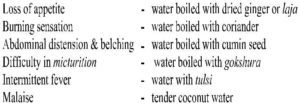
SIMPLE MEDICINES FOR THE OLD AGE 1) Loss of appetite Vaiswanara choornam with hot water. Ashtachoorna with ghee or gruel. Pippalyasavam. Abhayarishtam. Ginger juice with salt before food. 2) Constipation Vaiswanara choornam with buttermilk or Triphala choornam with hotwater or with Half glass of Amalaki swarasa. Fruits especially guava & grapes. 3) Sleeplessness Apply any of the following oil to head Cheriya chandanadi, Valiya chandanadi , Himasagara taila, Thungadrumadi taila . Kachooradi choorna with Ksheerabala (101) or Dhanwanthara (101). Powder of Alabu beeja-1gm with hot water at night . Sarpagandha powder -200 mg with milk at night. 4) Joint pain Daily intake of milk medicated with the root of Apply Kottamchukkadi oil , Dhanwan tharam oil or Karpasasthyadi oil externally. Jambeera potali sweda or Patra potali sweda. 5) Decreased vision Thriphala choorna with ghee or honey at bed time. Animal liver prepared with Pippali choornam Agasthya leaf (curry) occasionally. Anjana with Elaneer kuzhambu in the morning daily. 6) Bad odour of mouth Gargle with Thriphala kashaya or with water boiled with Yashtimadhu. Gargle with Tankana in hot water. Chewing the bettel leaves, Khadira gulika, Lavangadi gulika. 7) General weakness Take Amalaki juice daily. Take one glass of milk in morning & night. Mix Dasamoolarishta, Draksharishta & Lohasavam take 50 ml daily. Rasayana yogas like Chyavanaprasa should be taken in less quantity. 8) Adhmana (abdominal distension& belching) Water medicated with Jeeraka & Dhanwantharam gulika. Kashaya prepared with Lasuna , Krishnajeeraka, Pippali and root of Sthira Dasamoolarishta,Abhayarishta, Pipplyasava, Poothika suktha-should be taken. 9) Bhramana (Giddiness) Take ghee and sugar in equal quantity at night (if B.P is normal). 10) Itching and rashes over skin Apply Nalpamaradi keram or Bath in water medicated with Nalpamara (bark of 4 among Panchavalka). 11) Mild difficulty in micturition Seed of Ela in tender coconut water Apply luke warm Dhanwantaram tailam over umbilical region. Apply Ervaru beeja kalka (cucumber seed) Apply paste of cockroach faeces on naval. 12) Tooth ache Mix one spoon Arimedadi thailam and one glass of salted hot water and gargle. 13) Loose teeth Gargle kashaya prepared with Vakula Gargle Kanjika mix with thaila regularly. 14) Breathlessness(mild) Take equal quantity of clear ginger juice and honey. Siddha makaradwaja with betel leaf juice and honey. 15) Gradual loss of hearing Oil prepared with Bilwapatra juice as ear drops. Scope of Ayurveda In Geriatric Care Ageing is considered as an inevitable part of human life, but problems & complications during that period is not so. It can be prevented or controlled. Ayurveda has lots to do in this aspect. This system has got effective remedies in managing degenerative diseases. Adoption of special therapeutic modalities like Panchakarma & Rasayana chikitsa in time helps in delaying ageing, reducing the complications of ageing & minimizing physical & mental disabilities Major problems like constipation, giddiness, body pain, immobility of joints numbness, hemorrhoids sleeplessness, etc. can be tackled by means of Ayurveda through specific diet, simple medications & simple treatment procedures. Ayurveda is the system of medicine traditionally accepted, culturally suit & economically manageable for the society. It can be said that Ayurveda is a science that encourage the respect of society towards the elderly. Read the full article
0 notes
Photo
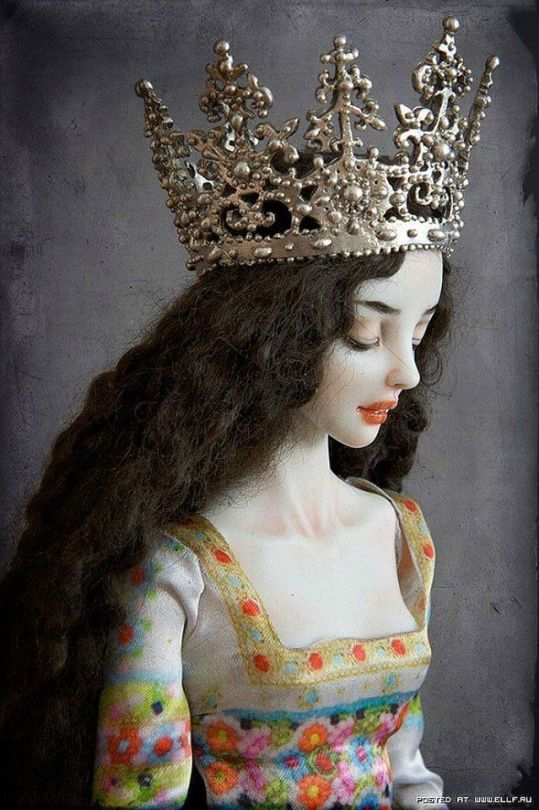

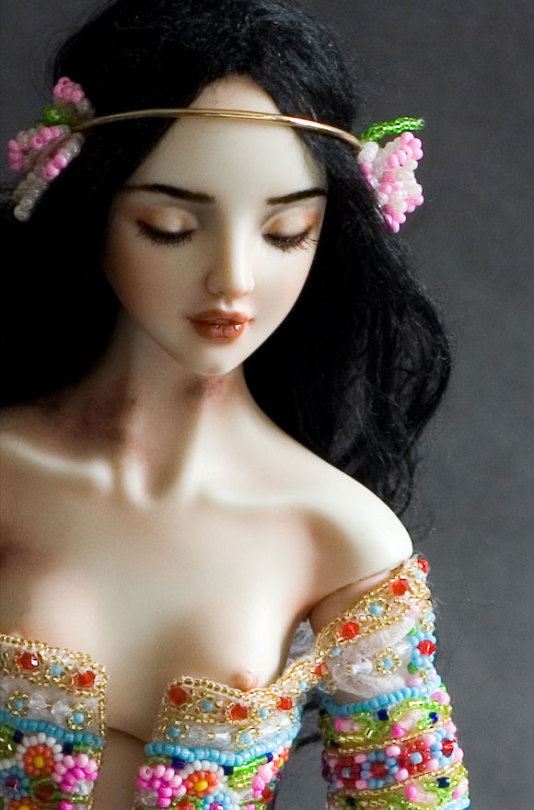
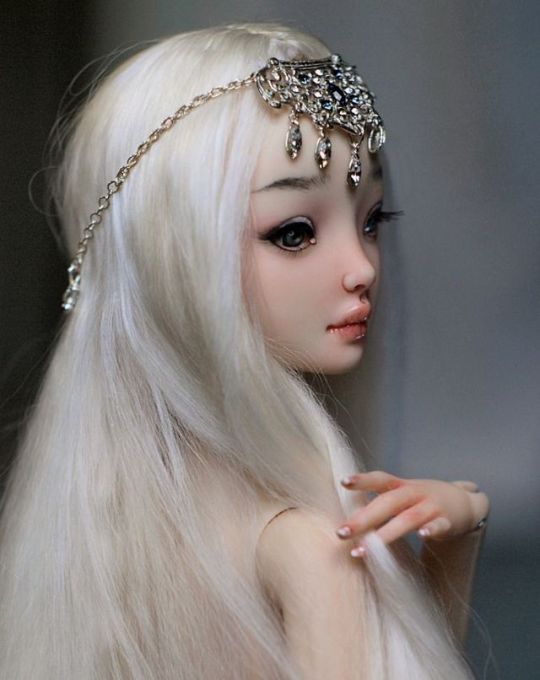
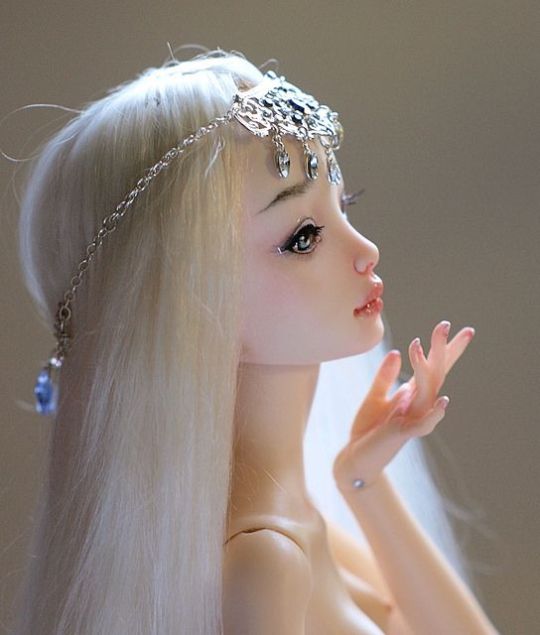
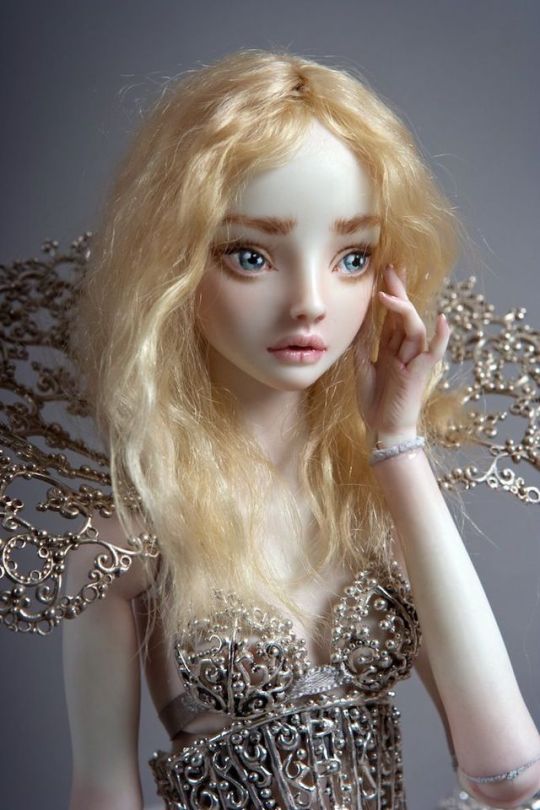
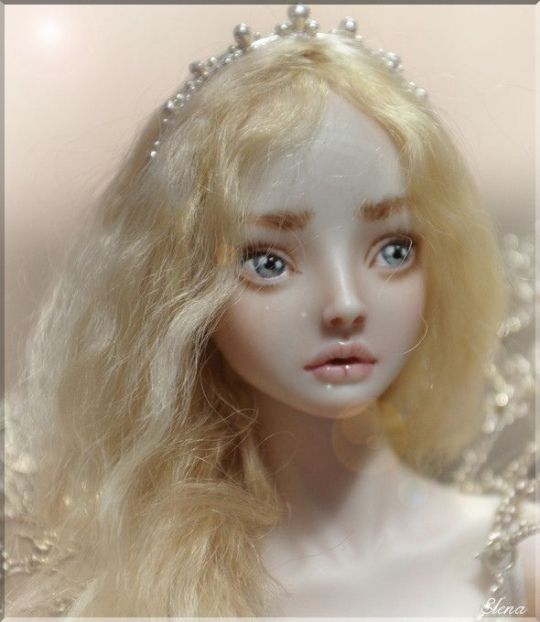

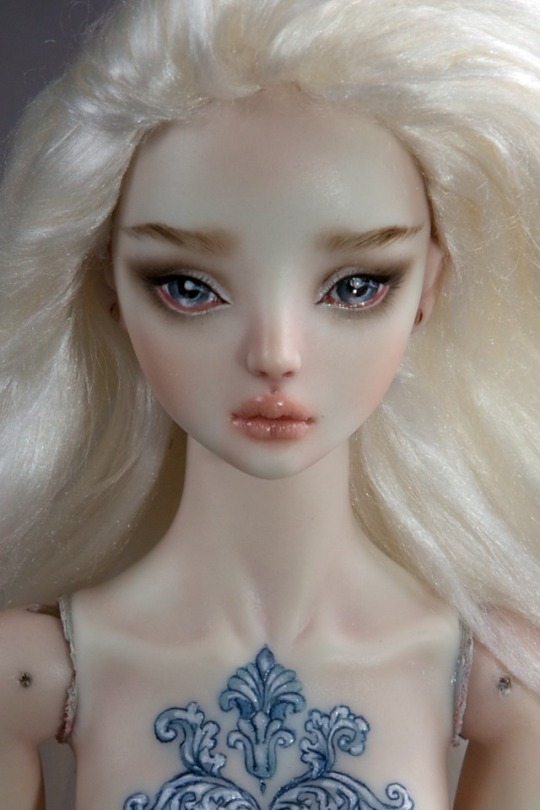

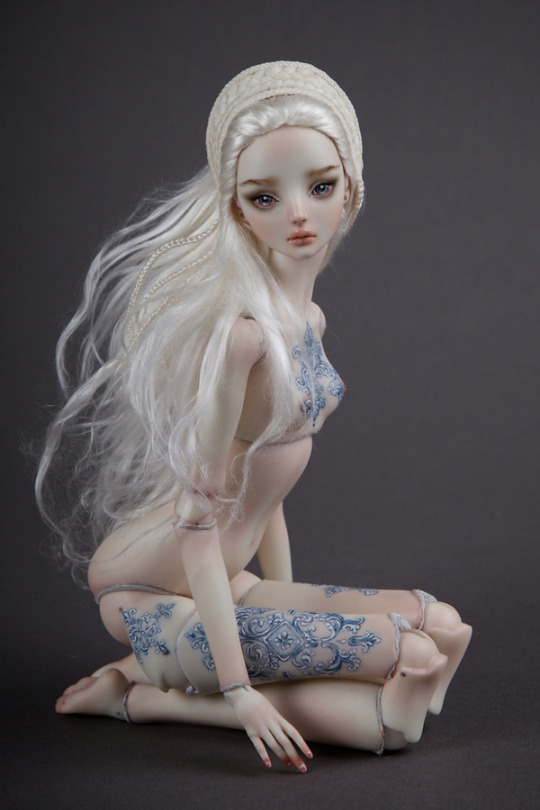
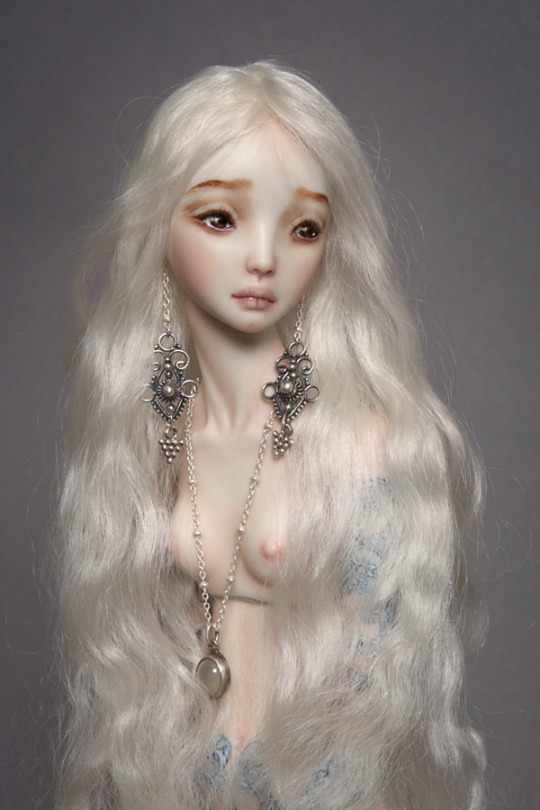
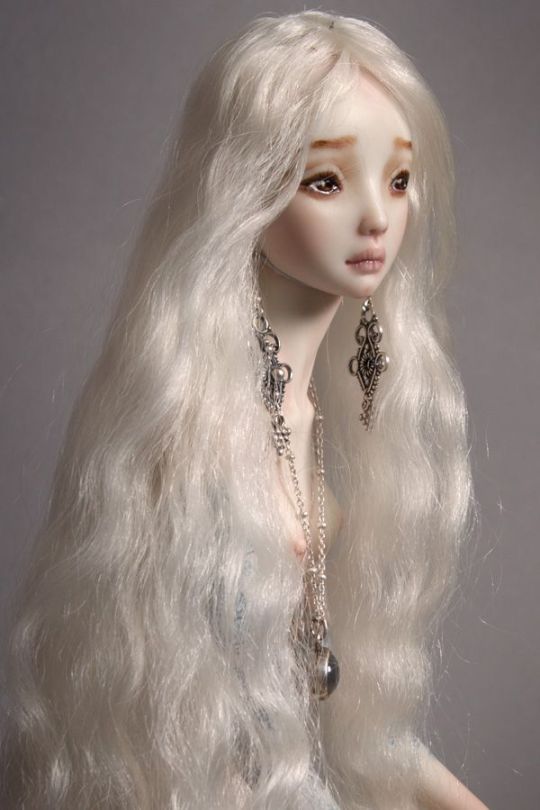
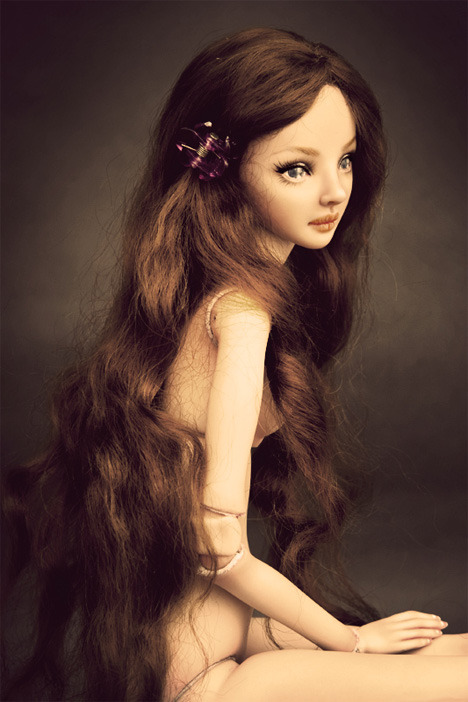
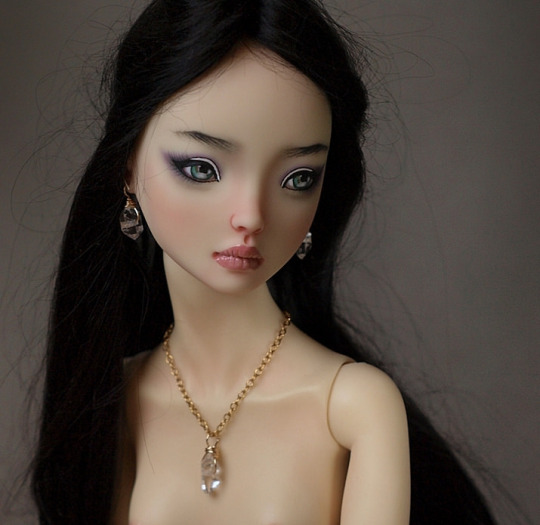

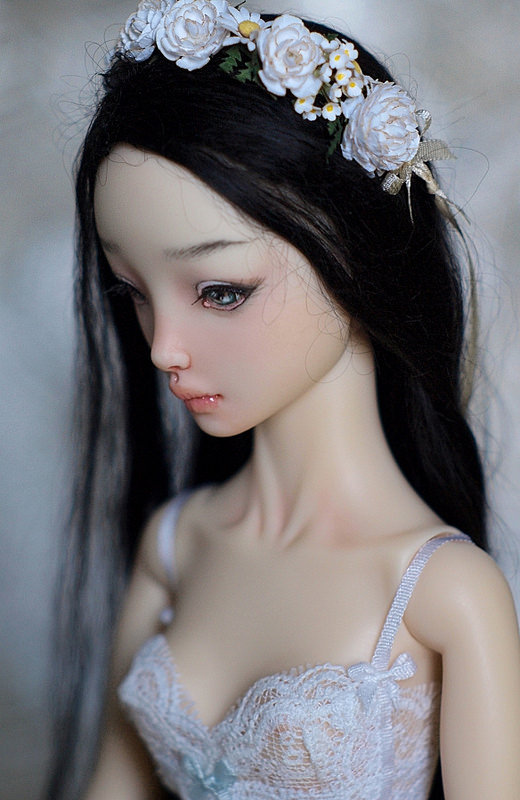
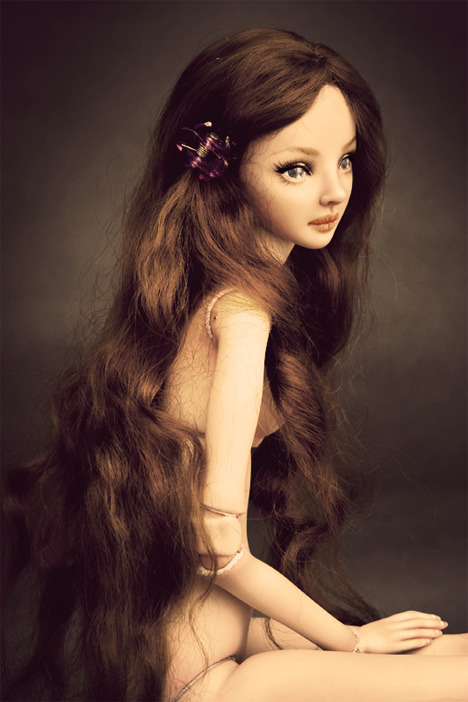
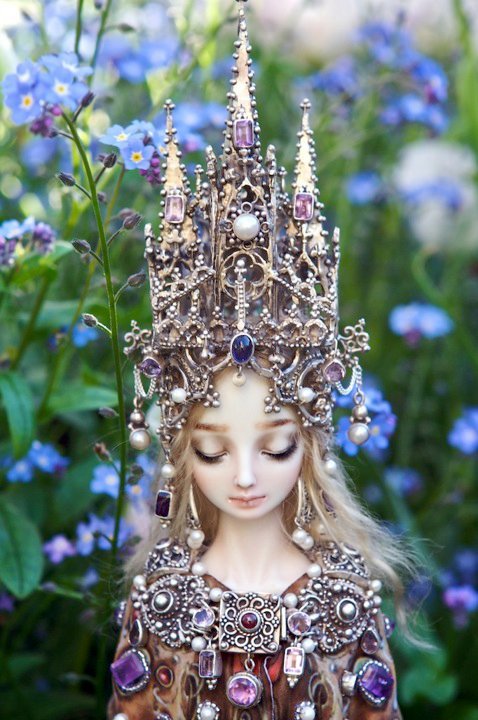
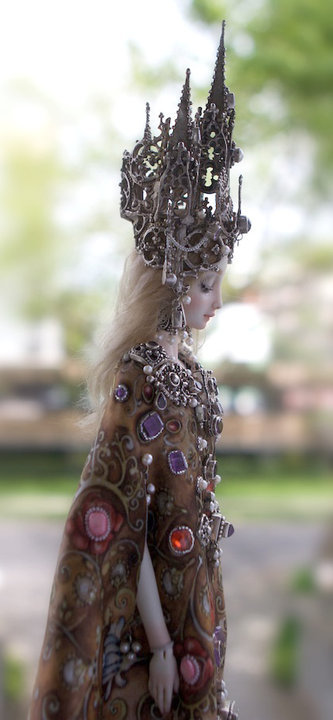
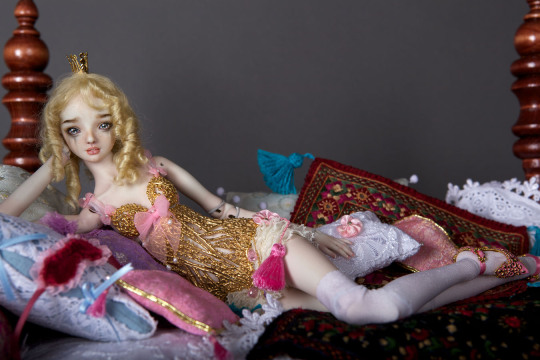
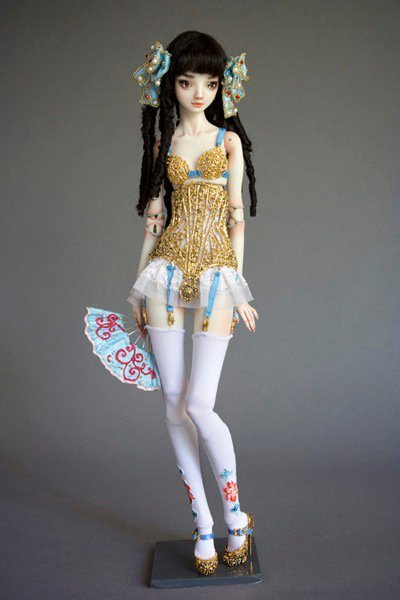
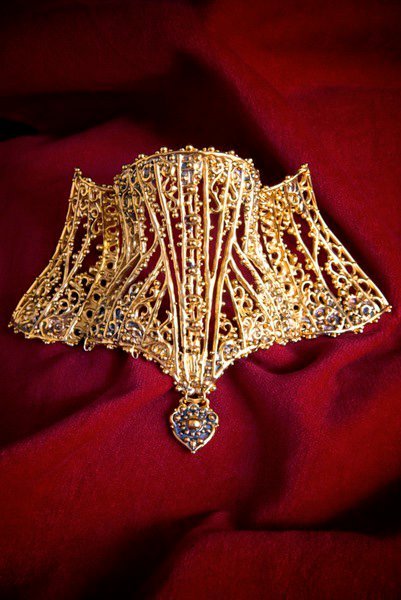
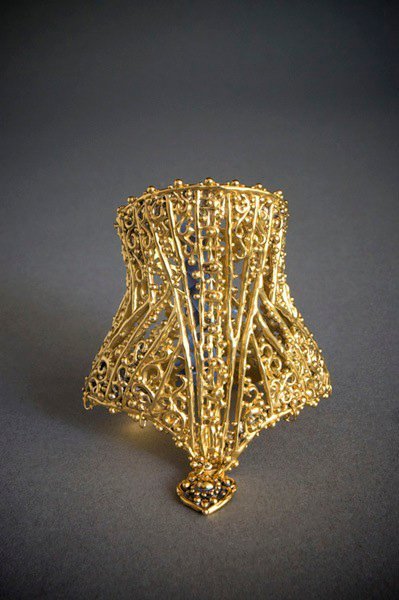
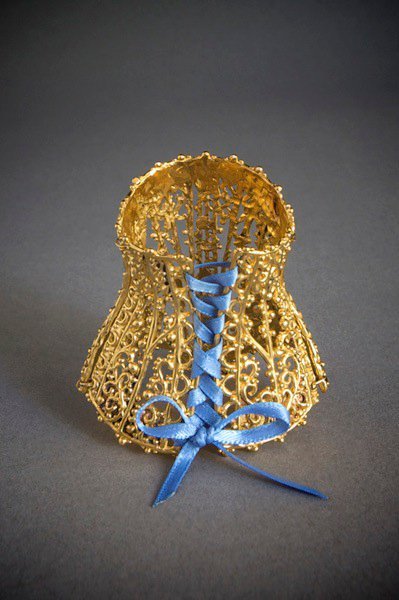
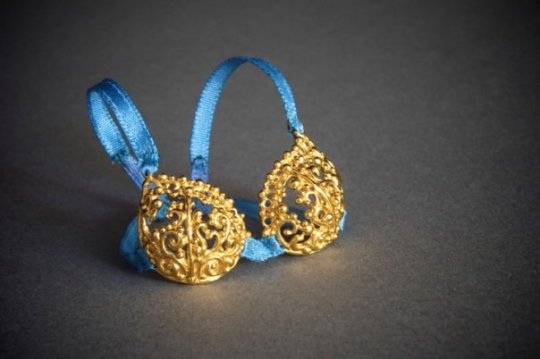
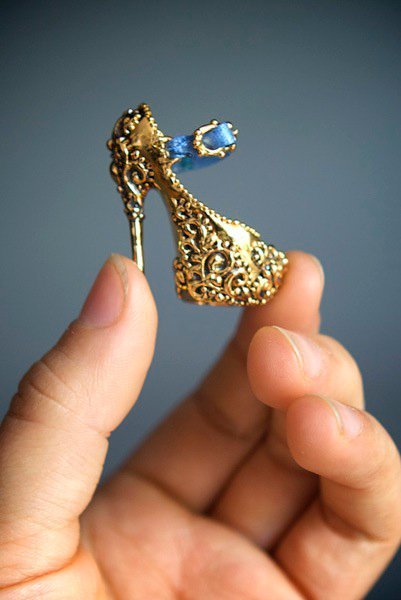
Marina Bychkova
Marina Bychkova is a Russian-Canadian figurative artist and a founder of Enchanted Doll™- a luxury toy label of exquisite, porcelain dolls.
More than mere playthings, Enchanted Dolls are elegantly sculpted and articulated works of art. Strikingly nude, engraved or adorned in opulent sculptural costumes of precious metals, gemstones, and rare found objects, each doll intricately conveys an aspect of our humanity. Unique and delicate, their forms evoke a strong emotional response, haunting us with their vulnerability. All at once innocent and sexual, Enchanted Dolls depict highly stylised images of femininity, while at the same time reflecting on life’s playful naiveté.
How many people are blessed with a clear vision of their life's passion and purpose the same year they start kindergarten ? Marina Bychkova is one of those lucky people. She knew at the age of six that her life ambition was to create a beautiful articulated doll. Today, at the age of 26, Marina's dream is coming true. While the 20 years between her first glimmer of her destiny and its realisation may seem like the blink of an eye to some of us, Marina has made every minute count.
Marina was born in South-West Siberia to a loving, adventurous family. Her engineer father, an inventor, instilled an insatiable curiosity in his oldest daughter. Her more down-to-earth mother taught her practical survival skills as well as caring for Marina's physical and emotional well-being. Her two younger sisters helped her develop empathy and awareness for others. As far back as anyone can remember, Marina was always making something out of something else. Her parents affectionately called her "anomaly" because of her constant inventions, which inevitably involved the creation and destruction of various household objects. At the age of five, Marina was cutting paper dolls out of mass media magazines and books. She vividly remembers seeing a hardboard folk doll with jointed arms in her kindergarten class. It lit a creative spark in her, even at that young age, and she knew that someday she wanted to make something similar. At six, Marina was hand-drawing dolls on paper. She also made her first attempt at creating a jointed paper doll. When she was seven, Marina saw her first Barbie doll commercial on television. To her, the doll was a vision of beauty that she never knew existed She remembers the moment as an almost religious experience, with Barbie aglow in a full white gown like an angel. She thought to herself, if there is a God, then it must look like Barbie. that same year, Marina made three-dimensional dolls from organic material such as flowers, twigs and leaves and continued to experiment with jointed paper dolls. At eight, Marina was still preoccupied with developing multi-jointed, hand-drawn paper dolls inspired by popular fairy tales and cartoon characters. She also started to sew her first fabric dolls. At nine, Marina sewed her first three-dimensional fibre doll using her new baby sister's soother ring for a head. She unravelled the sleeve of a knit sweater and used the wafting to make her long hair. The following year she made a small collection of fibre dolls while trying to perfect her fabric-jointed technique and improve the doll's wardrobe. She also sewed removable wardrobe pieces for fabric dolls. At 11, she resumed work on her multi-jointed, hand-drawn paper dolls and introduced other mediums such as ink pen, watercolour paints, felts and gouache to draw the dolls. At 12, she began a small business making and selling her dolls to her classmates for pocket money, and at 13, she made hundreds of multi-jointed, hand-drawn paper dolls for her personal collection as well as for sale. To put this in perspective, try to recall your own business plan in seventh and eighth grade. My plan for those years was pretty much to survive seventh and eighth grade. When she was 14, Marina moved to Canada with her family. At 15, she continued with her chosen technique for making paper dolls, but now she took her inspiration from North American teen-age culture and movies. Just when it seems like Marina's accomplishments are too super-human to be true, she hit a bump. At 16, she stopped making dolls entirely. For that year and the next, as she struggled to come to grips with her new culture and language, nothing of any significance happened with regard to her art and dolls. At 18, Marina tried to make a three-dimensional doll but failed due to a lack of suitable materials. In addition, like many 1 8-year-olds, she fell in love, and forgot all about dolls until she turned 20. Midway through her foundation year at art school, two very important turning points occurred. She discovered Polymer Clay and saw Peter Jackson's "Lord of the Rings: Fellowship of the Ring" movie. These two events jump-started her Doll making and she began to experiment with sculpting jointed Polymer Clay dolls.
At 21, while attending art school and working with Polymer Clay dolls, Marina began to recognize her true calling and to identify her style. It was in part inspired by her discovery of Sulamith Wolfing's art. She also made her first attempt at bead embroidery.
The following year was a milestone for Marina. Dissatisfied and restless at art school, she considered switching to a jewelry program. Her parents convinced her to stay in art school. She chafed against the limitations of Polymer Clay and made her first two porcelain dolls.
At 23, Marina entered her first two dolls in a local doll competition and took two first place awards in two categories. She began to consider doll making as her career and her life suddenly made more sense. The following year, she made her first ball-jointed porcelain doll. She also solidified her bead embroidery costuming style. Since doll making was her truest form of expression, she could no longer keep them separate from the work she was doing in art school. She found a way to integrate her dolls and her art school projects.
Twenty-four was a milestone year as Marina continued to make structural improvements in her ball-jointed porcelain dolls. She also graduated from art school and produced her first conceptual work involving her porcelain dolls for the grad show. "Necrophilia," based on the original classic Snow White fairy tale, was born, and Marina's style began to mature, opening up in different directions even though her medium remained the same. She began to get recognition for her work and photographs of her dolls were published internationally. For the first time, she knew that if she kept working, she could make all her dreams come true.
The following year, Marina's Enchanted Doll made a transformation to a smaller 13.5-inch doll with a fully jointed complex body. Over the course of the year, she polished the structural mechanics of the doll and made small upgrades to the body. She started her first Web site and received more media attention for her work.
This brings us to the present. Now 26, Marina has begun to include cast silver jewellery into her work which opens up a whole new set of costuming possibilities. Marina isn't sure exactly what drove her to love making dolls. All she knows is that the drive is irresistible and instinctive, like other body functions such as sleeping or eating. She has always made adult female dolls. Even when she was a child herself.
Marina was never interested in child dolls primarily because their context seemed to be limited to looking cute or holding some sort of stuffed toy. Marina found fully grown females more complex and intriguing because they seemed to have the capacity for conscious thought and a full emotional spectrum.
Marina's Enchanted Dolls are cast very small, hollow, and reasonably thin while being structurally sound and quite light. She chose porcelain because it has three major advantages over resin. First, it never ages. It is impervious to natural elements such as UV light, humidity or temperature fluctuation and will remain unchanged for hundreds and even thousands of years. Second, the doll's face-up and body blush are done in china paint which bonds with porcelain on a molecular level during high temperature firing and assumes its permanent characteristics, being able to withstands any kind of handling without ever coming off or being affected by any type of light. Third, porcelain is much harder than resin and is completely scratch resistant. It is somewhat more brittle on sudden impact than resin, but a fall can do as little or as much damage to a resin doll as it can to a porcelain one. These factors combine to make resin and porcelain dolls equally strong but in different ways.
An Enchanted Doll begins with idea and concept development. Marina finds most of her sources of inspiration outside the doll medium, to avoid repeating what has been done too often before. She sketches as many ideas as she can to record her thought processes, but only approximately half of her ideas make it to paper due to chronic time shortage. Instead of keeping journals or diaries, Marina has stacks of sketchbooks which hold all kinds of thoughts and ideas for future reference as well as to document her life.
Marina's initial sculpts are made in Super Sculpey. In this stage, all the ball joint mechanisms are worked out and fine-tuned even though the pieces themselves look a little rough. They undergo only basic sanding as the primary goal is to get all the anatomy and movement correct and to make sure pieces are undercut-free. Once the first set of molds are made, forms are cast, self-fired, sanded and high-fired to maturity to produce a set of final, smooth and perfect parts for a final set of molds.
Marina makes a set of master parts for master molds. She has to go through the mold-making process twice in order to avoid having to spend five hours sanding every doll in water. She still has to sand them, but this method cuts the sanding (or cleaning) process in half. Nonetheless, mold making is a labor intensive and a time consuming ordeal.
Finally, she clean-casts the actual doll She trims off some seams, opens up joint openings and drills holes for stringing The pieces are then low-fired in a ceramic kiln They still hove seam lines and require a thorough cleaning The porcelain is soft and fragile and needs to be soaked in water and gently scrubbed with fine sponges for a high sheen.
After the pieces are cleaned, they are dried and then high-fired to maturity. During this stage, the pieces shrink by about 10- 13 percent, so the size difference between the very first plastic sculpts and the final doll is about 20 - 23 percent less.
Next she points the china. China paint is transparent and it doesn't dry on its own. To obtain rich and saturated colours, china has to be built up in several separately applied coats. Every coat must be fired in between for a molecular bond with porcelain. In other wards, you cannot simply sit down and complete a painted doll in an hour or two. The painting process can take three to five days, because the kiln takes several hours to cool down after each firing. The upside to this time consuming process is that china paint is completely permanent.
Once the pieces are painted, they are lined with leather lining in the joints. Leather is essential to porcelain joints as it provides necessary traction for articulation. Leather has an excellent grip on polished porcelain and Enchanted Dolls pose amazingly because of this,
Marina strings her dolls with heavy duty miniature industrial strings made from carbon steel as opposed to the elastic cord used to string most commercial boll-jointed dolls. Each joint is isolated and strung up individually with its own spring and a different degree of tension so that the tightness of the spring is invariable, and the tension in every joint is constant and unaffected by the movement of other parts.
After the doll is complete, Marina glues on hair or makes a removable wig. The final stage is costuming. Although sometimes Marina is reluctant to caver up the beautiful, jointed body she has just created, she consoles herself by making the costume a masterpiece of bead and gemstone embroidery. She uses 24K gold, sterling silver, Austrian crystals as well as gold-lined seed beads and gemstones such as rubies, emeralds, pearls and more to adorn her doll's gowns. She never uses glue. Every tiny seed bead and every gem is sewn onto the fabric by hand. Generally, it takes between 150 to 350 hours to complete a costume.
Marina sells her Enchanted Dolls on the Internet which has made traditional middle-men such as galleries, dealers and representatives almost obsolete. She believes her greatest strength as an artist is her work ethic. In the words of Goethe, Real talent is composed of nine-tenths work and one-tenth genius." She loves setting high goals for herself and pursuing them with abandon. She does not believe in a balanced life style. Balance implies a golden middle which, to Marina, means mediocrity. In setting her sights on greatness, she eschews balance and deliberately chooses to develop one aspect of her life at the expense of others. Specifically, she sacrifices weekends, friends, eight hours of sleep a day, leisure, recreation, free time and hobbies in the name of creative fulfilment. Since dolls are her overwhelming life's passion, she spends virtually every waking hour working or thinking about the work she will do. Despite her youth, she has a keen sense of mortality and can't bear to waste a moment or an opportunity.
The people who most influenced Marina's art include both classic and contemporary illustrators. Sulamith Wulfing tops the list. Wulfing's work is in the essence of every doll that Marina makes. Kay Nielsen, Edmund Dulac and Arthur Rackum also inspired her as well as Alan Lee, James Christensen, John Howe and Natalia Pieranderi, with whom she had the pleasure of working.
Marina describes her work as highly decorative, figurative, and romantic. Like the art of Sulamith Wulfing, her dolls have a beautiful slightly haunted quality, as if they are caught in the original dark version of a fairy tale (as opposed to the cute Disney version). Marina is fascinated by the implicit sexuality and violence underlying fairy tales, and these undertones are apparent in her work, most notably "Necrophilia." It is this unique vision as well as Marina's artistic talent and rigorous aesthetics that imbue her dolls with a quality of edgy, slightly dangerous magic. No other artist is making dolls like this.
“ - The reason I love making dolls is because it’s such a multidisciplinary art form. I’m not content working in just one medium such as painting or sculpture, and dolls offer me a very diverse and satisfying tactile experience. To create a doll I get to do it all: sculpture, industrial design, painting, engraving, mold-making, drawing, metalwork, fashion and jewellery design. I want it all, or nothing !
My need to work with dolls became evident as a calling when I was six years old. As a child I became painfully aware and appalled at the mediocrity and the uninspired dullness of mass-produced dolls. This profound frustration coupled with my natural sensibilities inspired me to create my own dolls, suited to my own ideas of feminine beauty. A particular point of interest for me was not only the life-like articulation of the body, but also the beautiful balance between a delicate form and an extraordinary function of a doll. At first, I just wanted to have beautiful toys to play with for a change, but soon, my desire to make dolls evolved into its own passion for its own sake, and by the time I was ten I no longer cared about playing with what I made, because designing and constructing them became the most challenging, intriguing and entertaining game of all. Although I began selling my first articulated paper dolls to my classmates in grade five, I didn’t make a decision to commit to a career of doll making until I was twenty four years old and with 3 years of art school struggle under my belt. Surprisingly it was my conceptual art training at the Emily Carr Institute of art and design that influenced this choice, shaping the direction and stylistic qualities of my work into its present form. When I needed to come up with brand name to give my dolls an identity, I decided to name them after Paul Gallico’s fictional, short story called - Enchanted Doll -, where a young woman creates dolls with so much love that they enchant people at first sight with their compelling, delicate, life-like beauty. And this is my goal also.”



youtube
youtube
0 notes